#anyway my ideal form of representing this would have been a comic actually but that's more effort than i feel like putting in
Explore tagged Tumblr posts
Text
I often like to imagine my characters talking together. It entertains me, such as when I'd imagine characters guessing what the price of a grocery order would be when I worked as a cashier.
ME: Okay everyone, what does it look like this one will be?
A PROFESSOR: (shrugging) $277.60
HIS ASSISTANT (planned for a book I never did write; the extent of his existence was confined, then, to their grocery games): I think it's going to be closer to $163.45
(I scan the groceries. The grocery total comes to $250.09.)
ASSISTANT: You win this round again.
PROFESSOR: I suppose I'm not half bad at this.
But after years, last night I stumbled upon a new scenario while trying to fall asleep. I was testing new pillows, which did not happen to be comfortable compared to my usual ones.
In this scenario, each of the protagonists of their respective books were sitting at a table having a meeting. The protagonist of the upcoming book, let's call her 9 (because she's in the 9th book) was being welcomed into the committee as the new discussion leader, a role she would take over from 8, who had served her time for nearly three years. (In return, 7 gave 8 the task of keeping the minutes for the meetings, which I think 8 preferred a lot more).
(9 takes the highest seat at the table, and asks what concerns the other protagonists, responsible for managing their respective book casts, have brought this week)
1: (presenting a slideshow) S and Z are fighting in public. It's going to ruin our reputation. What should I do?
(the slideshow changes to a new slide, depicting a crashing stocks graph in a big red arrow line.)
9: Now taking suggestions on behalf of 1's inquiry.
3: (Raises his hand)
9: Yes?
3: Let them duke it out. One of them will eventually win, then the fighting will stop.
9: No.
6: I second that motion.
4: Conflict of interest.
9: What?
(Whispers of 'oh bless her heart' and 'she really is new here' flow across the table)
7: 6 is 3's daughter.
2: Then why are either of them answering? 3 is, after all, 1's grandson.
(9 looks at 3, then at 1, confused at how the youngest member of the committee even has a grandson.)
9: Any other suggestions?
2: How bad is it? You might have to shut down operations for a while.
1: Shutting down operations is not an option. Only you could do that more than once, 2.
5: Ride it out until the problem blows over?
8: Have you tried talking to them?
1: -_- what do you think.
9: Just keep them to themselves for a while. I'll see what I can do about the (gestures at the stocks graph). Anything else?
(1 returns to her seat. 8 rises.)
8: [Supporting cast member vampire] keeps biting people.
2: (Recalling when she shared a story with him pre-novel era and experienced his bites firsthand) Oh, he would.
#rubia speaks#NEW CHARACTER METATEXTUAL INTERACTIONS UNLOCKED!#i don't know the point of this except to get the thoughts out of my head and onto a screen#i've imagined cross-canon interactions with characters before (especially when they stopped sharing the same worlds)#but not with like all of the protagonists representing and managing their casts before lmao#anyway my ideal form of representing this would have been a comic actually but that's more effort than i feel like putting in#i might go sicko mode and elaborate the administrative roles and rules of this silly AU#beyond the newest protag taking the discussion facilitator role and the second-newest taking down the minutes
10 notes
·
View notes
Text
Superman Red Son kinda sucks.
Superman: Red Son runs with the premise "What would happen if Superman's ship crashed not in rural America, but rather in rural USSR, in the 30's".
The comic's answer, as it's written by the same dude who described his political views as...
"I regard myself as traditionally left of centre and progressive, a Eurosceptic in the Bennite mould, and the policies espoused by the coalition formed under the Yes umbrella are the closest to my own particular ideology."
...is naturally not great. Or rather, the comic takes steps in a much stranger direction than it should, with Superman eventually becoming a sort of dictator in the USSR (because, as we know, the USSR had absolutely no democratic institutions or elected officials, they just chose a dude to succeed the previous one and that was it) and actually leads it to a weirdly Trotskyist and prosperous future, with the USSR "expanding" and "taking other countries under its wing" with the help of Brainiac, who becomes a sort of "helpful A.I." to sort things out.
Eventually we get to the point of basically recreating the setup for Atlas Shrugged. Superman's USSR has dominated the entire globe except the USA, which is a bastion for capitalism and democracy and elects Lex Luthor to fuck them up. Superman, as a spooky scary socialist, is lobotomizing people and turning them into passive robots (because Mark Millar thought lobotomies didn't exist in the 30's...? Like, it's a technology that existed and we know the USSR didn't do it for political control) who can't question his rule. With the exception of the Batmen, who are part of a disgruntled working class who apparently suffered under the secret police. I think Ukraine is mentioned there, perhaps the holodomor, it's been a while.
In a surprisingly empathic move in the end, Luthor says to Superman "fuck you man, you're a good person deep down but you're too overbearing and That's Bad™️ so perhaps chill?" and Supes goes "huh, that's true, maybe lobotomizing my political opponents IS cringe." Brainiac, who was there in the corner, goes "ah! ah! ah! you fell into my-" and before he can finish the sentence he blows up, but Superman flew him to space and exploded too.
Anyway the USSR falls because that's how countries work I guess, Luthor also becomes a sort of dictator and also incorporates parts of Superman's philosophy, cures all sorts of things, invents all sorts of advancements alone, creates a whole ass dynasty, stays in power for a thousand years and dies. It's God-Emperor of Dune but if that was portrayed as a good thing, essentially. Superman is immortal, apparently, and didn't die in the blast, and after a couple billion years the earth explodes and a descendant of Luthor sends his son back to the past and he lands in a little ukrainian collective get it it's like poetry it rhymes. (I'll admit it is a little bit clever how he takes Superman's surname, "El", and says that it was actually an L, from Luthor, whatever, I like cheesiness)
So yeah it's not the most politically coherent story out there. The USSR's communism is demonized because apparently it'll end up with lobotomies but it still falls to great man theory, yet the most ideal system in the end is one where Luthor micromanages the whole economy of the world. It's funky, kinda not great but not horrible either, and the art is pretty good. But that got me thinking: what if an actual Marxist-Leninist wrote this?
Like, what would Superman do if he was a communist? More importantly, what developments of theory would happen if a superpowered, but apparently benign alien decided to start helping people and natural disasters and shit?
I don't have a great answer for this tbh. I just think Superman represents the best in all of us, and there's no way in hell he'd take on as an unelected dictator.
The worst part in all of this is the cognitive dissonance Millar seems to have where Lex admits Superman was doing material good, but this clashes with his notion that the USSR could be anything other than the kingdom of the Devil himself on earth.

#communism#marxism leninism#comics#dc comics#superman#socialism#also kulak Batman killed by Stalin's own son is so cringe lol#Grant Morrison wouldn't have done this to us#Millar is a fucking hack
2 notes
·
View notes
Note
Hii, I loved your MK latinidad post!
I have a few ideas to share, speaking from my own identity as a Latin American person ((oh also I’m just referring to what's portrayed in the tv series, cause I’ve only read Lemire’s run of the comics so I don’t have much more info to go beyond these two))
I love and crave Latin American MK so much it is unreal :( Yet I’m not satisfied with how the intersection of the cast identities with their characters’ mayyybe is being taken by some people in the fandom space as a fulfilling form of representation.
I mean, it directly ties to a larger set of issues topics that go beyond what we’ve been shown so far in the series (as in, we’re kind of limited to those 6 episodes lmao)
Anyway, going back to the intersection of identities, I think that knowing about the cast’s latinidad it’s like seeing the machinations inside an author’s head. There’s a lot of information that we know about MK’s reality that is never actually mentioned within the canon of the series. By this I don’t mean that nothing can be left to interpretation, but that we’re actually lacking ties to the characters' latinidad within their own world. Like the thing in which we know Steven in his white suit is Mr. Knight but that name is never mentioned in the tv series.
It's obvious, like you said, that these casting choices are a confirmation of the writer’s and Oscar’s interest in portraying Latin American identities. But because of this lack of material representation of latinidad in this particular case, the info about the cast’s ethnicity doesn’t actually build on some new meaning to the show. I believe that we should see it as the founding bricks for something that we will be eventually shown in a hypothetical S2 or any kind of continuation if we ever get one (I cling to these details not to lose hope lol)
Yet, we shouldn’t close the series onto itself. I think that we should rethink the line between what’s shown and not shown (through imagery and background elements as the show uses MK’s surroundings perfectly to scatter around a whole lot of their identities), especially when it comes to such complex and ultra-layered representation. Like, we cannot cherry-pick where we blur and when we don’t blur the line between inside and outside info and meaning. I mean that’s how the wild understandings of DID in real life and as portrayed by the series probably originated.
On an almost completely different note, this all ties to the inherent complexity of Latin American identities. Most times the term Latino on its own is not enough to portray the enormous diversity of it, the complex relationships within all social and private spaces and latinidad and how our identities have either been rebranded by ourselves to “copy an (European) ideal”, how others have rebranded them and created an unnuanced view of latinidad, and how the term itself is not enough to represent what we put behind it. This is like a whole field of study on its own so, yeah, long story short, it’s great to see the beginnings of its portrayal in MK and I love what it brings to the table, even if we have little to work with!
(with this I finish I swear, this turned out way longer than I expected lmao)
I’d love to see Marc and Steven, specially Marc, reconnecting w his Latin American identity through their relationship w Jake… probably bringing some brand new characters or characters from the comic but with Latin background that Jake got to know throughout time (I think maybe Gena Landers would be a great friend for them to bring into the tv series) and that maybe he has this kind of found-family-like relationship with. I think it would be a nice way to talk about Marc’s relationship with his heritage and to separate his latinidad from his mother’s image. GOD if only I had time to do this, I think my life would be fulfilled
Anyway, I can’t wait to read more of your ideas on this! Hope you’re doing fine! :)
Thank you so much for this comment, it is so intelligent and well thought out, I was a little intimated to answer so I hope I did ok. I am well thanks for asking. I hope you’re ok too 😁❤️
I think you made a fantastic point that the line between the actor and their real-life identity and the fictional character they portray is blurry. Paul Rudd being a Jewish man doesn’t necessarily make Scott Lang/Ant-Man also Jewish but Zendaya being biracial does then make MJ bi-racial. Actors are actors and they shouldn’t just be limited to roles that perfectly match their own personal identities. For POC especially, there are simply not enough roles written for POC actors. I joke that there are more MCU characters named Steve than Latino characters with names, but is it really a joke? What makes it blurry for Oscar Isaac and MK is we’re not just talking about his Guatemalan-Cuban ethnicity, but also about him being mixed race. He himself jokes about being ethnically ambiguous but the reason we perceive him that way is because we fail to recognize ingenious features. The Spanish conquistadors and the US government have worked together to genocide, to disconnect “Latinidad” from indigeneity(and in some cases blackness). By creating labels like “Mestizo,” by saying “Latine isn’t a race,” and forcing us to check for ‘white’ on the census, it disconnects us from our history and grants us conditional “whiteness.” Even if MK is never openly confirmed to be Latino, why is the default white unless proven otherwise?
For me, in my heart, it is nondebatable that MK is Latino. Jake’s Spanish, costume, MK’s family and young MK’s is all the confirmation needed. While any explicit reference confirming MK as Latino would be nice, I personally do not need it. MK being Latino is a hill I will die on.
Casting Oscar Isaac as Marc Spector/Moon Knight was a color-blind casting choice. Nothing about how the character was written in the show was changed in order to reflect the character's potential identity. They could(and should) have explored internal and external barriers to mental health within the Latin community, alcoholism and substance abuse, tendencies to look away when it comes to domestic abuse, generation trauma, and the intersectionality of being Latino and Jewish but they didn’t. As much as it pains me to say it, MK is not a Latino story just because the main actor is Latino. It could be, and hopefully they explore those topics in s2, but as it stands, it is not.
On the other hand, Layla is an identity-conscious casting. They didn’t just hire May Calamawy as Marlene Alraune, they rewrote the characterization in an Egyptian context. Calamawy and Diab worked together to create Layla and bring her cultural identity to the forefront. Layla’s passionate about her country, she’s opposed to foreigners exploiting and stealing Egyptian artifacts, she speaks Arabic. They reimagined some minor comic book characters and turned her into the first Egyptian/Arab superhero. She is an Egyptian character.
As fans, we shouldn’t grow complacent with representation, hiring a minority actor isn’t enough. There need to be more stories about POC for POC. I desperately want MK to team up with Robbie Reyes and Gael García Bernal's character and talk shit in Spanish. I want Marc to reconnect to his Latindad through Steven and Jake, and learn to see it in a context outside of his family. I want them to explore what it means to be a Jewish-Latino. I want Marvel to hire Latine writers and actually tell our stories.
In case anyone is interested, Khadija Mbowe has a fantastic video about Color-blind vs. Identity-conscious casting
#moon knight#marvel#marc spector#steven grant#jake lockley#usaigi speaks#layla el faouly#asks#oscar isaac#may calamawy#also anon you're v kind thank u for the ask#moon knight meta#usaigi meta
25 notes
·
View notes
Text
Am I about to overanalyse another throwaway gag? Absolutely! This time it's from the classic season one episode, Napoleon Brainaparte.
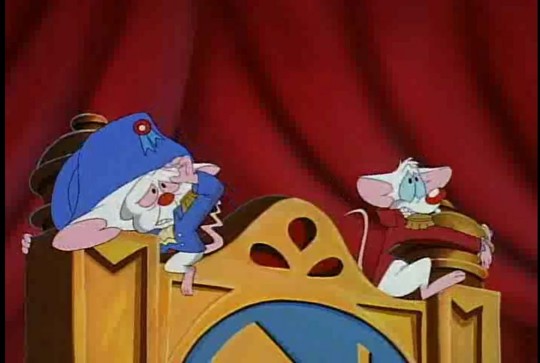
So, towards the very end of this episode, our poor, beloved mice are about to meet their tragic end. They're threateningly informed that an afterlife awaits them, and as they cower in what they believe to be their final moments, the viewers are given a glimpse into their heads...specifically, what they each imagine heaven to be like. This scene surprised me on my first watch, because it was pretty unexpected. And surprisingly...sweet?
Let's start off with Brain's idea of heaven, which is shown first.
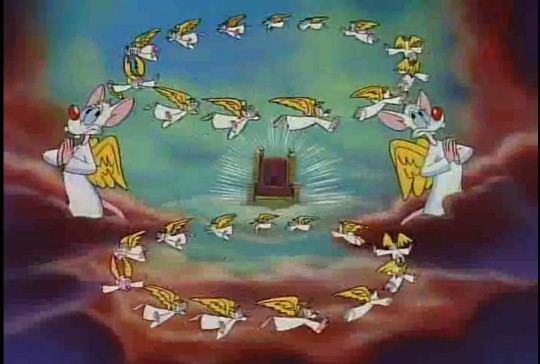
Right off the bat we have him surrounded by a chorus of Pinky angels. This is one of the rebuttals I have for people who doubt Brain cares about Pinky...I mean, if I didn't like someone, I definitely wouldn't include them in my idealised afterlife, nevermind multiple versions of them!
Uh, I digress. The thing I actually want to draw attention to here is the fact that Brain actively desires Pinky in his life (or, afterlife, in this case) and can't imagine existing, in any form, without him. We've seen it time and time again, from the episode "Snowball" to that one story from the comics, but this is one of the earliest, most apparent instances of it in the show. This scene alone proves to the audience that Brain isn't using Pinky to reach his goals, but genuinely sees him as a friend and a companion. And maybe there's an unhealthy splash of codependancy in there.
To take this a step further, an afterlife is commonly portrayed as a sort of perfect world; a place of eternal happiness, even. It's safe to assume from this daydream that Brain subconsciously associates Pinky with the same joy and contentment associated with heaven. We can even interpret this scene as Brain viewing Pinky as an angel, which is not only heart-wrenchingly sweet, but makes a fair bit of sense, all things considered.
After all, though Brain himself tends to shy away from explicit displays of emotions and empathy, he's been established to admire these traits in others. In "TV or not TV", he claims to find Princess Diana (who was well-known for her activism) attractive, and he repeatedly praises Pinky's kind nature throughout the series, even when it directly interferes with a plan. He even sabotages his own plots when Pinky objects for moral reasons, eg "Inherit The Wheeze", and then there's the iconic instance of him DESTROYING his own machinery after tearing up over Pinky's Christmas letter. I believe this is why Pinky is an angel in Brain's eyes: he's compassionate, he's pure-hearted, and he's innocent. Well, innocent in the sense of intention, at least. Pinky represents all the things Brain is too afraid to be himself, lest morality get in the way of his goals.
On top of that, Pinky always stays by Brain's side. He's the only person/mouse who has never left him, hurt him, or betrayed him. It's natural that someone so lonely, cynical and self-loathing as Brain would view his polar opposite as a literal angel...or, even more impactfully, a full chorus of them. Of course Brain's idealised heaven has himself as an angel too, but I'd say that's either his ego coming into play (he's both self-hating and conceited) or just to serve as a visual signifier that he's...um, dead. The flock of Pinky angels is what I'm focusing on here, because the sheer amount of them in comparison to Brain highlights them in this miniature megalomaniac's reverie. And also because it's more interesting to take the analysis in this direction! ♡
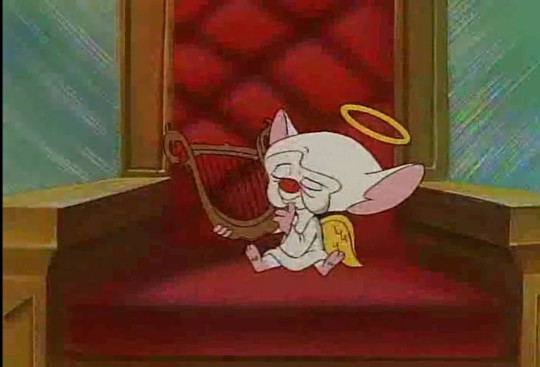
Honestly, there's not quite as much I can say about this segment of the scene. Brain is on a throne, so presumably he's imagining himself ruling...heaven? Good for you, Brain!
It's very in-character for Brain to put himself as the centrepiece of his ideal afterlife, and as much as I love this little guy, the angel imagery is obviously ironic. Whether intentional or not, this can be connected to his egotism, as well as his belief that everything he does, no matter how severe or morally corrupt, can be justified by the end goal of ruling Earth and making it a better place. I don't believe that Brain genuinely sees himself as an angel when it comes to his purity, but rather that he thinks all his sins can be forgiven if/when he becomes the "benevolent dictator" (his words, not mine) of the planet...or maybe that's just what he tells himself to be able to sleep at night.
He looks noticeably very content and calm as an angel. I would go off on a tangent about how this is a version of Brain who is finally freed from the burden of his never-ending cycle of failure, and that this suggests that he needs to break out of his world domination obsession to ever be truly happy, but...I'll spare you.
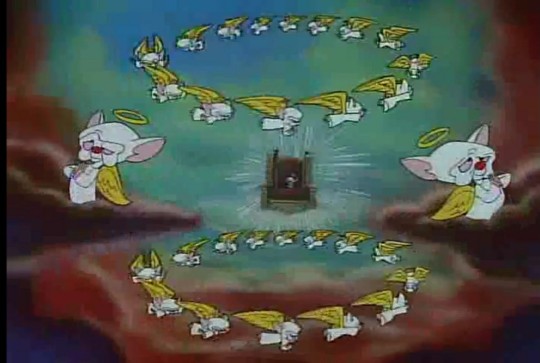
Oh, Pinky. Poor, poor Pinky. He's so selfless that it stings :(
It says a painful amount that in his idea of heaven...he's not even in it. I don't think he hates himself, yet he's so good-natured that he ends up neglecting his own desires for the sake of others. In this scene, he has literally forgotten to include himself in his own idealised world. I hate to say this, but this could be a result of his codependent relationship with Brain. He's so focused on Brain's happiness and goals that his life almost revolves around him at this point, and as I mentioned before, they fall apart without eachother. Pinky pours his heart and soul into helping Brain, partly because he genuinely believes Brain will make the world a better place, and partly because he'd do almost anything for Brain's sake. His love for Brain is so strong that he's the focus of Pinky's own paradise.
What I find significant is Brain taking the role of every single angel in the fantasy. He's portrayed as a sweet and wholesome creature wearing a cute smile, a stark contrast to reality. Even just him being an angel in the first place implies that this is how Pinky sees him. A big part of the latter's motivation to help Brain take over the world, though scarcely mentioned in the show itself, is so it can become a happier, nicer place for everyone. As a determined optimist, Pinky shares the desire to improve the Earth, and so views Brain as a sort of hero, someone surely worthy of a halo and wings.
His view of Brain as a good person can be explained further when we consider that he doesn't mind being bopped (and in some interpretations, downright enjoys it), can shrug off any verbal abuse, and clings onto any snippets of warmth he receives from Brain. The things others would raise their eyebrows at are things Pinky ignores or adores. I think it's safe to say that, overall, Pinky is the type to focus on his friend's positive traits and simply ignore most of the negatives, as seen in "Pinky's Plan" when he gives an extremely sugarcoated description of Brain to the world leaders. Because of all this, in Pinky's mind, Brain truly is an angel. It's bittersweet, really.
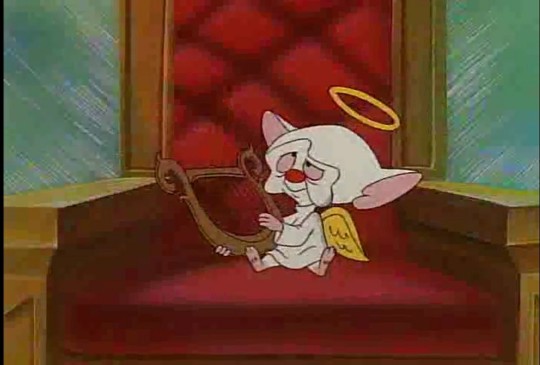
And here we have it again. Brain on the throne, ruling. This is all Pinky truly wants—for his friend to be happy, fulfilled and at peace, making whatever world he may rule a better place. There's not an awful lot more to say now, since this is just a repeat of the scene from Brain's fantasy, but I think that's the most heartwarming part. These two mice are working towards the exact same goal, and yet their reasons for doing so are quite different: Brain to rule the world, Pinky to make his friend smile. It's almost poetic in its simplistic beauty. The voice actors said it best when they described the show as a "desperate love story", and the little scenes like this only prove that to me.
Welp, that's all I have to say for now! I haven't reached this hard since I tried to get to the chromatica oreos on the top shelf in Tesco. But this was fun, anyway! Thank you ever so much for reading :'D Your patience must be incredible! 💕
105 notes
·
View notes
Text
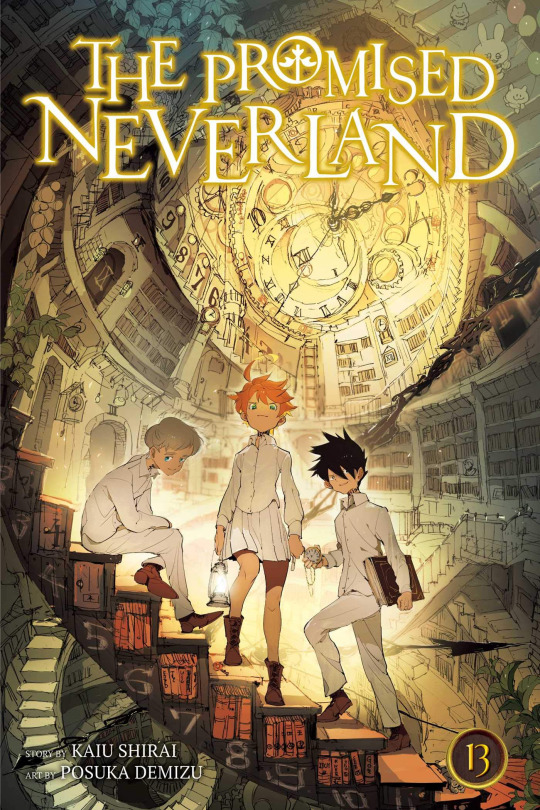
The Promised Neverland is kind of really good, actually? I mean, yeah, I’m late to the party as usual, but I just binged the first season of the anime, and then the manga from that point on (the site I was on didn’t have any of the second season, but apparently it diverges from the comic and gets bad anyway, so maybe just read the comic to begin with). And, I mean, spoilers, obviously, but I’m going to get into some extremely major spoilers here so if you haven’t read it or if you’ve only seen the first season of the anime maybe skip this post and read the manga, but...
...
I’ve tried and failed to write a big long post about all the ways it’s so good, how the main three characters are each so compelling, how its pitch dark but not cynical or misanthropic, with mortal stakes but not gore-porny, positive and optimistic without being trite or naïve, how choosing Emma out of the main three to be the primary protagonist and viewpoint character keeps the story from becoming a masculine militaristic power fantasy, how the antagonists are treated as characters and not just monsters - even the ones that are literal monsters, about how the story never supports or glorifies the idea of sacrificing the weak so that the strong can survive, about how empathy and understanding and a chance for peace are extended to every single villain without putting a burden to forgive on victims and without ignoring the need to fight those who refuse the offer of peace and uphold the status quo, how the story opposes oppressive hierarchies at every turn - not just those the monsters use to control the human children at the farms, but also how the monster elites use access to human meat to controller the lower social classes of monster society, and even to an extent within the human resistance.
But there’s just way too much to talk about to get it all into one big giant post, and I don’t have the stamina for a big extended ongoing project right now - or else I’d return to one of the like 12 I have on hold.
But, like, to pick just one thing....
ok, so eventually we learn what the monsters are and why they eat people. They’re a weird sort of organism that can temporarily take on the characteristics of things they eat. Eat a bird and grow wings, eat a bug and grow an exoskeleton, eat a human and gain a humanoid body and the intelligence to become self aware, learn language, form societies - for a while. But if they go too long without eating people, then they lose their minds and revert to a bestial form. In order to save the humans, the resistance leader Minerva plans to wipe out the monster society altogether. After all, they literally have to eat humans to continue being people, there is no possibility of peace.
Protagonist Emma, though, has seen not just the horrific human farms and their cruel and corrupt rulers, but also their towns and settlements, their families and children. She was even saved at one point shortly after her escape by friendly monsters who opposed the farm system, and even though it seems impossible, she wants to save both the humans and the monsters.
A more typical show, at least among those with premises as dark as The Promised Neverland, wouldn’t take Emma’s side in this. She would be forced to ‘grow up’ and face the fact that she can’t save everyone. Her naivety would get someone killed to break her heart and teach her to be hard and cruel as if those things are virtues. Or, more likely, she wouldn’t be the viewpoint character to begin with, she’d be a side character whose ideals would get herself killed in order to elevate the male characters’ angst and justify their violence. Either way, the message would be “Emma’s ideals were unrealistic and could never survive contact with the harsh reality of the world.”
TPN instead takes Emma’s Side. She finds monsters who maintain a humanoid body and intelligence without eating humans, and they’re able to spread that trait to the rest of monster society while the humans all escape to the human world. Now, as much as I don’t like the grimdark ‘there is no peaceful option’ hypothetical version of the story, this development could have been handled pretty badly. Like, just reading it like that, it sounds like the story raised a big moral dilemma and then chickened out of it. But that’s really not how it comes off while you’re reading it, for a couple reasons.
First of all, Emma meets the non-human-eating monsters early in the story, long before we get the explanation of how monsters in general work. So by the time we learn that the monsters must eat humans to maintain their self identity, the audience already knows that there are exceptions and that an alternative exists. The story never sets this up to be a moral dilemma in the first place, so when the issue is bypassed it doesn’t feel like it’s undercut itself.
More importantly, though, is the thematic & metaphorical content. Because the monster society is a pretty explicit metaphor for unjust human societies, and monsters represent the people who make up such societies. Not just the aristocrats who benefit from the unjust society, or those who directly enforce and uphold it, but also regular people. People insulated just enough from the suffering and death that their lives are built on that they can turn a blind eye to it, but aware enough of their complicity in that suffering that they construct excuses to justify their part in it, and by proxy excuse those at the top who actually benefit from and shaped the society as it is. People living lives simultaneously just comfortable enough to keep them docile, but precarious enough that they’re too caught up with struggling to maintain the tenuous grasp on the lives they have to feel like they can work towards anything better. Monster society in TPN is a cage built out of the corpses of humans cattle, but built to imprison and enslave the monster civilians who eat them.
Hanging the story on the fantastical element of monster biology would divorce it from that essential metaphor while also endorsing an outright genocidal worldview, and TPN explicitly calls out the plan to wipe out the monsters altogether as just that - genocidal. It never even pretends to entertain the notion that the audience should accept that plan as the right choice, even while it doesn’t condemn Minerva for pursuing it. When Emma is proposing her plan to Minerva, the deal she strikes with him is ‘I will try to make my peaceful solution happen, and if I succeed then you cancel your plan to wipe out the monsters’. Minerva is eventually shown to be lying when he makes that agreement, but Emma isn’t, and note the if there. If Emma’s plan fails, then she - and thus the narrative - accepts that Minerva’s plan to save the children is still better than leaving things as they are, even if it means wiping out all the monsters. After all, the society IS monstrously unjust, and even the lower classes within that society ARE complicit in that injustice.
Minerva’s problem isn’t even presented as a matter of him hating the monsters too much to see a route to peace with them. The story doesn’t frame the conflict between Minerva’s and Emma’s plans as hate vs. love or revenge vs. forgiveness. It’s instead more of ‘hierarchy and division bad, mutualism/openness/relying on each other good’. The point is to show how Minerva’s role as a figurehead who believes he has to project strength to uphold the hope that the other humans have placed in him has worn away his ability to rely on others or to be open to alternatives they offer, leaving him with rigid and inflexible thinking.
So when Minerva learns about the monsters who don’t need to eat humans, he doesn’t see an opportunity for a better outcome - potentially even an easier outcome since he doesn’t have to make enemies of the entirety of monster society - rather he sees a threat to his plan to starve the monsters back into an animalistic state.
And if that whole subplot isn’t explicit enough, Minerva’s internalized need to project strength also results in his physical body wasting away in secret from a condition he believes to be untreatable, but the moment he finally breaks down and admits he needs help Emma is able to point to a solution, one that again doesn’t come across as a cop out because again it takes the form of another character the audience was already introduced to a long time ago.
In a story arc that the second season of the anime adaptation apparently cut entirely, wow the more I hear about anime season 2 the worse it sounds. And after the first season was so good....
...
Anyway, I tried to pick just one thing and this post still turned into a colossal gushing word cascade, and there are so many other elements to talk about. Like how The ‘Mothers’ and ‘Sisters’ are menacing villains with seemingly no empathy for the children, but when Sister Krona realizes she’s lost the power struggle with Isabella she leaves the kids tools to help them, and then when Mother Isabella realizes the children have escaped, she covers up the route they used in order to buy them a little extra time to get away. It’s these little touches - just as much as the short backstories that follow them - that show us how, while they might uphold the system out of fear for their own lives, and might have rationalize their part in it in order to live with the horrible things they’re doing, the mothers and sisters don’t actually hate the children. Knowing that makes it believable when in the end Isabella does turn on the system, and every single one of the other mothers and sisters join her.
The bit when the fighting is mostly over and she tells the Mother at the house “it’s over, now we can just love them” and the other woman breaks down crying is so sad and human, it makes me tear up thinking about it..
Like I said, all the villains are characters, not just monsters. They all have motivations for the horrific things they do - sometimes irrational, often selfish, but not even the most unforgivable of the monsters are just evil for evil’s sake.
Again, I’m rambling. It’s just... I’m used to these sorts of pitch dark dystopias being, for lack of a better term, kinda fashy in their messaging? Or at the very least deeply cynical and misanthropic and just kind of mean spirited. And TPN is so completely the opposite of that, in so many ways.
#tpn spoilers#tpn#the promised neverland#anyway yeah it's pretty good#though again apparently the second season of the anime falls of the rails#like from reading reactions today#it seems season 2 drops or completely flubs literally everything I go into in this post#don't watch it#i haven't#and feel better off for it#edited because I misremembered a couple things#like the 'we can just love them' line comes after the fighting not before#the point remains though
25 notes
·
View notes
Note
your ideal billy/teddy duo comic (plot, character designs, artists and writers involved etc)
One thing that I've always wanted to see is a comic about Billy and/or Teddy that was produced entirely by mlm creators. Vecchio, Robles and Gracia are all gay artists who've worked with the characters on recent titles, and I'm eager to see more from them. While none of these artists have ever shown the characters in a way that exactly suits my wants, they've each demonstrated a clear personal vision of who Billy and Teddy are that I can respect. I find that Vecchio and Robles, as illustrators, both articulate a gay sensibility in their designs and are able to represent a range of gay identities and expressions with not only dignity, but real love, which is frustratingly hard to come by. Oh, also, Kevin Wada covers, because duh.
Writers are a little bit more difficult for me. I love Anthony Oliviera and I know that he's got a lot of ideas for the characters, so I'd be delighted to see anything that he might pitch. Vecchio also does write, and his creator-owned series, Sereno, is an urban superhero story in a modern fantasy setting-- something he describes as Batman Beyond meets Sailor Moon. Based on that, I think he'd do a great job telling a story about a witch and shapeshifter from New York. I know that Sina doesn't work for Marvel anymore, but I've always wished he could've done Billy and Teddy in a sweet little rom-com miniseries, or even just a single issue special. He's particularly good at writing tender, funny, and just unapologetically gay characters who signal authentic elements of our culture and community without making them cheap or laughable. That is a quality which I find essential for Billy and Teddy, and it's part of why I want more mlm creators to work with them.
If you had asked me this question last year, I would have had an easier time pitching ideas for these characters. I'm eager to see what the future holds for them, but "rulers of an interplanetary nation" was never part of my vision for how Billy and Teddy would be spending their early twenties. I did have this idea for an ongoing series about their "college years", wherein Billy would be studying magic with Wanda and Agatha, and Teddy would work part time with Carol or Alpha Flight while attending community college or learning a trade, like piercing or tattoo artistry. The idea was that they'd often spend time apart, as they'd each be focusing on their own careers and having individual storylines, but they'd always come home to each other at the end of the day and lend each other support, in ways both mundane and super-heroic.
I used to imagine that they'd stay in that nice apartment Sunspot got them, which would act as sort of a crash pad/base of operations for a revolving cast of their friends. They could convert one of the rooms into a magical sanctum for Billy, and another into a study room or art studio for Teddy. Tommy, America, Kate, or whoever could crash on their sofa whenever they're in town or need to do a team-up. Wanda could help Billy ward the apartment so that he and America are the only ones who can portal in and out, but then Loki would find a way to get around the wards and cause trouble, and there'd be a whole dramatic reunion. The whole idea could easily be adapted as a Young Avengers ongoing if you widened the focus from the main couple and treated it as an ensemble piece with individually chunked plot-arcs, much like the original series.
Unfortunately, that idea no longer holds as much water as I'd like because, for one thing, they lost that apartment and never explained why-- it seems like it was passively retconned out in between New Avengers and Death's Head. More importantly, they now live in space, with Teddy being a busy ruler of an interstellar Alliance, and Billy his prince-consort.
I would still like to explore the idea of them pursuing separate goals and working in separate fields while never being truly apart. Empyre introduced a clever plot device wherein Billy is now able to sense Teddy's location and teleport to him instantly, no matter the distance, which, I assume, works in reverse as well. This feat of magic is made possible by their marriage, which binds them symbolically and draws on the power of their love. They can go anywhere and do anything on their own, and still be together again at a moments' notice, which is super romantic and also affords them more flexibility than most superhero couples. I would still pitch a series about Billy doing magic work on Earth while Teddy does diplomacy in space, and one can always warp to the other when they need backup fighting a bad guy. They could even switch back and forth between staying on Teddy's throne-ship, and getting cozy at Billy's little Manhattan apartment when they want to get away from it all.
I guess my final answer is that I want the two of them to be fully realized, individual characters whose love is illustrated through mutual support rather than, like, being glued to each other's hips. The things that I want to see Billy doing are very far removed from the things that I want to see Teddy doing. Superhero characters tend to lose momentum when you marry them off, and superhero couples tend to fizzle when you keep them apart, but Billy and Teddy's unique strength is that they're never truly apart, and their relationship never seems to lose steam-- they've been a pair from the start, and... they're a little obsessed with each other.
The Billy story that I most want to see right now is a full Maximoff team-up. It could go in one of two directions: A) a quest to uncover Natalya's history and finally vanquish the Emerald Warlock, in which they're waylaid by Doom and other magic villains from their past, while teaming up with their magical friends around the world-- basically a sequel to Scarlet Witch; or, B) a showdown with Krakoa and a resolution of their relationship with Erik, which, best case scenario, partially reverses the Axis retcon and proves once and for all that the Maximoffs are mutants. If we got a longer series, we could actually do both plots-- they learn something about Natalya which leads them back to Erik, and the two arcs become a larger story.
The Teddy story that I most want to see is a Guardians-esque space romp with political elements featuring Teddy, Xavin and Noh-Varr as, like, a sexy-alien-boys version of the Gullwings from Final Fantasy X. Does that make sense? I don't have a great grasp on the political landscape of Marvel Space so it's a little hard for me to come up with details, but I know that the status quo has been totally upended, so there are going to be different factions and movements springing up, and likely no shortage of villains and space monsters rearing their heads when the dust of the war has fully settled. Teddy's a monarch now, but he's also been set up as this Arthurian hero-king, so I think there's still room for him to go on adventures and fight his own battles with his magic sword and, maybe, a crew of loyal space knights.
Having said aaaallll of that, I would absolutely die for a full-on fantasy adventure story with Billy and Teddy. I mean, Teddy's a king with a magic sword and his husband is a super-powerful witch. It's gotta happen. I'd actually be into them having a rematch with Mother, who is a pretty adaptable villain, in that her abilities and motives will differ depending on how she's been summoned. I'd also really like them to have a chance to go up against Sequoia directly, and on more even grounds. Quoi is such a great enemy for them because they represent the same generation of Avengers babies, and, actually, Quoi's origins are directly tied to Billy's-- their respective parents had a double wedding together. Sequoia and Teddy's arcs in Empyre paralleled and contrasted each other beautifully, but the two characters had no meaningful interactions. I want to see thems as arch rivals, and maybe, begrudgingly.... friends? Plus, I love that they're both alien princes who live in sci-fi stories, but whose aesthetics and powers are pure fantasy-- Quoi's a dryad wizard and Teddy is King Arthur, if King Arthur was a gay anthropomorphic dragon.
Anyways, that's my Wiccan+Hulkling pitch. The first arc is Billy and Teddy facing off against Sequoia in a magic forest that he's grown on his new planet, only to find out that they've been set up by Mother.
In the second arc, the three of them grudgingly team up against Mother while hashing out their shared backstories and giving Quoi, who's literally never had peers to relate to, a chance to fully come to grips with the way he was conditioned and manipulated by his father. Instead of conjuring dead parents, Mother seems to be able to summon dead children, which makes her particularly dangerous around the Cotati, Kree and Skrull, who've just emerged from a war and have countless recent dead.
In the third arc, Mother has freed R'kll and they've set their sights on Earth. Billy heads out with America and Tommy to ask Loki for advice on defeating her, while Teddy brings Sequoia before the Avengers as his charge in order to ensure that Quoi receives provisional immunity.
Loki is able to provide insight on how Mother might have been summoned and what the parameters might be for breaking the spell that's tethering her to Earth-616. It turns out that Mother is essentially holding Anelle's soul hostage and has been appearing to R'kll in her form. Mother's hold, at this point, has spread to the entire Alliance, and Teddy will have to defeat her or else she'll use it to destroy Earth and decimate his nation in the process.
Teddy recruits Wanda to help face Mother down. (side note, I'm desperate to see more of their relationship as in-laws.) Wanda agrees to work with Sequoia but insists on calling Mantis and making them talk.
The final showdown is the three boys, plus Wanda and Mantis, against Mother, R'kll, and an army of dead alien soldiers. Mantis and Wanda are able to pull Anelle's soul from Mother's grasp, but this doesn't banish her-- Mother's true anchor was R'kll, who'd been carrying Anelle's ghost in her heart ever since the destruction of Tarnax.
R'kll believes that she's always acted in the best interest of her nation, and she thought that bringing back Teddy's mother would finally make him see her way. Anelle and Teddy have a tearful reunion, but he admits that the only mother he's really mourned was the woman who raised him.
Wanda, Mantis, and Anelle, as a trio of mothers united with their lost sons, are able to reverse and seal Mother's power, which was based on lost children. They are not able to banish her, however, until R'kll steps forward and sacrifices herself, believing now that the best she can do for her nation is to rid the Alliance of the curse she brought upon it.
R'kll and Anelle begin to dissipate, but R'kll's sacrifice has called forth the spirit of Mrs. Altman, who is finally granted some closure and dignity in death by getting a chance to see how far Teddy's come and the peace that he's built in her memory.
Lots of crying! I made this sad. I'm sorry.
41 notes
·
View notes
Text
Ace Attorney and the Finally Kind-Of Okay Queer Representation
Note: This post contains massive spoilers for Turnabout Academy, the third case in the 3DS game Ace Attorney: Dual Destinies. There are also spoilers for a few cases in the earlier games. Please only read on if you’re okay with that.
I love Ace Attorney, but as a series it is fraught with bad queer representation. It really says something that the first queer character that I felt pretty good about was five games in. Most of this bad rep is in the form of effeminate, gay-coded men that are written as evil and/or comic relief. A brief rundown:
1) Redd White, the power-hungry CEO of Bluecorp;
2) Jean Armstrong, the cowardly café owner who lied on the stand (and who is repeatedly misgendered by the judge for comic relief);
3) Florent L’Belle, the greedy Mayor’s Aid.
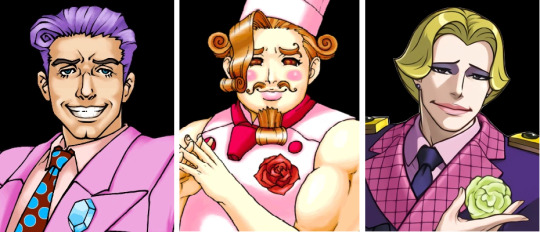
All three characters are presented as a mix of negative stereotypes and bad-faith comic relief. They’re dark spots in an otherwise really fun series, and it’s made me very uncomfortable interacting with each one as I’ve played through the cases. I’ve never felt worse about Ace Attorney than when it’s punching down on gay-coded characters, all of whom were written with no redeemable qualities. I mean, two of them were the actual murderers in their respective cases! Honestly, it just sucked.
That’s why I got so excited (and also super-nervous they would botch it again) today while playing through Turnabout Academy, at the moment when one of the characters is revealed to be explicitly trans. I’ll go over the general facts and then discuss why this was a step in the right direction, but still very flawed.
In the case, Robin Newman is a high school law student and a close friend of the defendant. In the early stages of the case, Robin presents as a very masculine individual and even wears a chest brace that is supposedly proof of her manliness. This whole time, she’s represented as a very aggressive and unhappy person. But on the first day of the case, it’s revealed that she put on a feminine costume belonging to the defendant because she really wanted to wear something girly. When further pressed, she comes out in the courtroom and reveals that she’s actually a girl—the chest brace was hiding the fact that she had breasts, and her parents raised her as a boy as some terrible step in forcing her to become a prosecutor when she grew up. Afterward, she’s a very cheerful, peppy person and says that she’s grateful she finally gets to live life as a girl and pursue her dream of becoming an artist.

As a trans woman myself, I started getting really excited as soon as it became clear that Robin put on the outfit—and even more excited when it was finally revealed that she was a girl who had been raised as a boy. The first thing that tipped me off to my gender identity was wanting to wear women’s clothing, so this gender euphoria through clothing scenario was something that I could relate to on a deep emotional level. And while I got nervous at first because the blame for the murder was briefly pinned on her, that ultimately goes nowhere. This is the first queer character in an Ace Attorney game that is represented as kind, positive, and trustworthy. Robin is wonderful. I love her so much.
But now I want to dive into where parts of her portrayal are still negative, and how Capcom made several missteps that ultimately resulted in Robin not being as fleshed-out and three-dimensional as she deserved to be.
First, Robin’s reveal is still treated like comic relief at times. I was really uncomfortable when several characters said “he was a she???” or something to that effect. Given that “he-she” was once a widely used transphobic slur for trans women, it wasn’t in good taste. Also uncomfortable was the fact that as soon as the big reveal happened, she took on a bunch of hyperfeminine behavioral and vocal tics. The worst was when she started swooning every time that anything shocking happened for the rest of the time she was on the stand. It felt like this was just a way to play up the comedy side of “hey, she’s a girl now.” She was forcibly outed in the courtroom, and then magically showed no trauma or self-doubt afterward. It almost felt like she wasn’t there to be a serious character anymore. Later, she thanks Athena for outing her. I think that sends the wrong message.
What did the game do right when portraying her? I loved how visibly relieved and happy she was after coming out, though it sucks that she didn’t get to do it on her own terms. It’s later revealed that she had confided in a professor about her gender identity and had a plan to come out to the school, so that was a nice touch. I also really liked it being mentioned that she had been raised as a boy, removing most of the ambiguity about what we were seeing—that this wasn’t a self-imposed repression of her authentic self, but something that had been forced on her. They used the right pronouns for her throughout the entire rest of the case without slipping up even once, thankfully not misgendering her for laughs like they did relentlessly with Jean Armstrong two games earlier. She was also just a really pleasant character to be around afterward, so that was nice.
What would be on my wish list if I were asked to help in rewriting Robin to be a more positive example of trans representation? First, I would fix her character’s comedic behavioral tics. Most witnesses have some silly animations, but the fact that all of her tics after being outed were hyperfeminine to the point of parody made me uncomfortable. Are there other ways to make her a bit quirky and visibly feminine without punching down on her burgeoning relationship with her gender? I’m sure that there are. It would also be nice for her reaction to being out in public for the first time to be more on par with what you might actually expect if a trans woman found herself in that situation. She probably feels relieved, but also a bit scared, embarrassed, and hesitant about how she’s supposed to act now. I would love to see some of that reflected in how she talks and in how she acts. Maybe she’s daydreaming of what she can wear now that she’s out, and that’s interspersed with nervous hair-twirling and curtsying at awkward times.
I’d also like her to say something to Athena about how she wished that she wasn’t forced to come out in front of a bunch of people like that, but she’s happy that she gets to be herself. Anything other than thanking Athena for outing her with no qualifiers. The fact that she was forcibly outed needs to be portrayed as a traumatic moment. Sure, something good came out of it and Athena didn’t immediately realize that that’s where the cross-examination was going, but it shouldn’t have happened. An apology from Athena would also be nice. She should feel at least a little bit guilty about outing someone in the middle of a courtroom, even if that someone was much happier afterwards.
Finally, I’d love for there to be less ambiguity about the events that led her to this point—and ideally, something that more explicitly shows that she’s a trans woman. The way her dialogue was written, I think the writers were trying to portray her as having been assigned female at birth, but later forced by her parents to take on a male identity for…some reason. It’s never explained why they would want to inflict that on her. She’s trans regardless of her sex at birth if she was forced to live life as a boy for her entire childhood, but I think that it could be handled better. A few possibilities that I like more:
1) She was already in the middle of gender transition, and started wearing the chest brace when her breasts began to develop since she wasn’t ready to be out in public—especially to her parents, who might have cut her financial support off if they had known. After all, she was at a prestigious private legal school. That must have been a concern.
2) She was intersex, and her parents raised her as a boy when she was growing up because that’s unfortunately what happens so often with intersex children—they’re forced into one side of the binary or the other, and sometimes they find out later on that their parents didn’t make the right choice or that they don’t identify with a binary gender identity at all. Robin had breasts because she was born with both male and female sex characteristics, and try as her parents might to force her into manhood, she still had a uterus. Not every intersex person is trans, but plenty are.
3) Or just…remove the bit where she’s revealed to have breasts altogether, and keep in the fact that she’s a girl who was raised as a boy! Why does she have to be “a biological female in disguise”? While either of the above two options would have been good ways to explain the fact that she had breasts, I’m not giving the writers enough credit to have thought of one or the other. If they had, it would have been hinted at. On some level, it felt like they were saying “it’s okay everyone, she’s not really trans. Look, she had breasts all along!” If that’s what they were trying to do, then screw it; just change the reveal but nothing else about the character, and make her an unabashedly AMAB trans woman.
Anyway, those are my thoughts on the topic. I recognize that this was super long-winded, but I needed to get my thoughts out—anyone who’s interested in this and got something from the long read, I’m glad that I was able to provide some insight. And I’m not even done with the series yet! Maybe they did do better! I don’t have my hopes up, but maybe! Anyway, please feel free to reblog this post with your thoughts or message me if this inspired any opinions of your own. As long as those thoughts aren’t “Robin isn’t really trans or queer at all.” I don’t need that kind of negativity in my life.
Have a great day, everyone! And thanks for reading!
#thaumaturgethoughts#ace attorney#dual destinies#Robin Newman#trans positivity#queer representation#trans character
92 notes
·
View notes
Text
Rai tries to explain the furry fandom for non-furries for the 24963569356586th time because I have no life~
I’m sure I’m preaching to the choir posting this here, I just still often see people in the general internet being confused about or flat out wrong about what furries are and why we like the things we like. So here I go again, taking my frustrations out by making a long-winded tumblr post about it. But hey, if you’re confused by furries or know someone who is, maybe this will help idfk
Just be warned I am an ADHD motherfucker and there will be about 10x more words than necessary.
To start, What Are Furries?
Furries are simply self-identified fans of anthropomorphic animal characters.That is, a character that is an animal, but with many human characteristics. This can include speaking human language, human-like facial expressions, walking upright in a human-like way, wearing clothes, etc. Examples of anthropomorphic (or anthro for short) characters include Bugs Bunny, Mickey Mouse, Sonic the Hedgehog, Disney’s animated Robin Hood, Zootopia, and Beastars. All things in which the “animal” characters behave and express themselves like humans. Even movies like The Lion King and Balto have what would be considered “antho” characters, due to their capacity for human thought, speech, and facial expressions, though they would be in a subcategory often referred to as “feral” or sometimes “non-morphic” in which the character still moves and behaves largely like an animal.
So to reiterate, a furry is simply a self-proclaimed fan of anthro animal characters.
Why Anthro Animals?
I mean the obvious answer is, because it’s fun. It can be really fun and get one’s creative juices flowing trying to figure out how to blend human and animal characteristics. It’s an animal that moves and acts like a human. In what ways is it like a person, and what ways is it still an animal? Popular media like Zootopia and Beastars address that question as major plot points and worldbuilding elements. But it can also be fun to think about just when creating your own characters. And aside from just figuring out how to blend characteristics, the animal aspects of a character can offer more options of expression. Ears can perk up, droop, or fold back, tails can wag, lash, or tuck between legs, growling, hissing, etc. People often use expressions comparing human behavior and emotions to animals. You ever find yourself so happy or exited you think “If I was a dog my tail would be wagging!”
And aside from being an interesting concept to think about, sometimes it’s just aesthetically pleasing.
What is a “fursona”?
Fursona is short for “furry persona”. A BIG BIG part of the fandom is original characters. If you look at a furry art website you might see some art of Judy Hops, Legoshi, Sonic, etc. But mostly you’ll see original characters. They tend to be the main focus of the fandom. Because all the things mentioned above are fun to play with, and the fandom is big on creativity and self-expression. And what good is self-expression if you don’t use it to express... yourself? A fursona is an anthro animal representation of oneself. Basically “Me, but an [animal].” These can be an accurate representation of oneself (example: someone who is short and meek and skittish might make a mouse fursona) or a more idealized version of who you want to be (example: same short meek skittish person might instead make a lion fursona because they wish they could be more confident, strong, and outgoing). Some people even make multiple fursonas to represent different aspects of themselves (Think Thomas Sanders’ “Sanders Sides” but with fur). In the fandom, your fursona is also often how you represent yourself to others. In real life there are aspects of your appearance you can’t control, or that can be very hard to control. Your height, weight, bone structure, etc. But online as a furry, you can look like anything you want. This is also a very attractive concept to trans folk and queer people in general, which may explain why there’s such a high percentage of queer furries compared to the general population.
What is a Fursuit and Why do People Wear Them?
A fursuit is simply a costume made to look like a furry character. it is pretty much no different from cosplaying comic, anime, or video game characters, except that most of the time fursuits are of original characters instead of pre-existing ones. People wear them for fun and self-expression, just like any other costume. They differ from mascot suits in that they tend to be of higher quality, and more form-fitting and expressive. Fake furries are usually pretty easy to spot on TV because they usually end up in cheap Easter bunny costumes.
While “fursuiters” are often the “face” of the fandom to outsiders, most furries don’t actually own a fursuit. They are expensive, cumbersome, take work to maintain, and don’t always play nice with certain health conditions and phobias. I personally am apprehensive about getting one because I worry I’ll have difficulty breathing, and I easily overheat. Others simply don’t see the appeal of dressing up.
Do Furries Think They Are Animals?
Generally speaking: No. People often mix up furries with a subset of otherkin known as Therians. Otherkin are people who believe themselves to be in some way non-human, usually spiritually or mentally a non-human creature. Therians in particular believe themselves to be in some way a non-human animal. Furries are on the other hand, as I said, just fans of anthro characters. While there are likely furries who are also therians, most are not.
People who approach furry conventions to yell “You know you’re not really an animal!” at the fursuiters is about the equivalent of going to an anime convention and shouting “You know you’re not really Naruto!” at the cosplayers.
Is Being a Furry a Big Part of a Person’s Life?
It varies, just like any other fandom. Take anime for example. Some people just watch it and maybe talk to their friends about it and that’s it. Others might go online to view fanart and read fanfic, even go to conventions. And some people fill every aspect of their life that they can with it, filling their home with merch, getting tattoos, even building careers like being a youtuber around it. The same goes for furries. For some people it never goes beyond consuming media and art, while for others it plays a big part in their day to day life.
Is it a Sex Thing? (VERY ADULT AND SENSITIVE CONTENT BELOW THIS POINT)
I won’t beat around the bush here. There IS a sexual side to the fandom, just like any other fandom. Any anime, comic, video game, TV show, book, there is a sexual side to its fandom. Furries are no different. Just like it’s easy to find anime porn, it’s easy to find furry porn. People be making porn, idk what to tell you.
“Isn’t that zoophilia?”
Some people seem to feel that way about it, but no, not really. The thing that differentiates furry porn from watching two dogs hump at the park is that the characters are anthro. They think and express themselves like people, and fans relate to them as they would with human characters.
This

is in no way the same as this
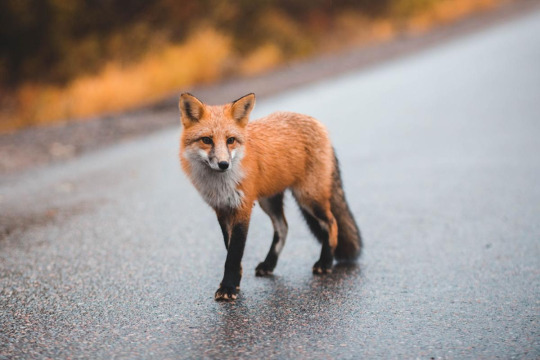
“Do people have sex in fursuits?”
Generally, no, for various reasons. 1. They are expensive and take work to maintain and keep clean, and you don’t want to get various fluids on them. 2. They can be cumbersome and get really hot and stuffy, not ideal. 3. They just aren’t made for it. They don’t usually offer access to ones’ genitals, and thus having sex in them would be rather difficult.
There ARE some people who will get suits specially made for having sex in, with holes in all the necessary places, but you’re not likely to see those out in public. Generally if you see someone walking around in public in a fursuit, you can rest assured it’s probably not been used for sex.
“Ugh but that’s weird!”
I mean, people dress up and roleplay characters during sex all the time. Is dressing up as Krystal the Fox all that different from dressing up as Harley Quinn? And anyway, what does it matter to you what consenting adults get up to in the privacy of their own bedroom? Maybe don’t think too hard about other peoples’ sex lives.
And despite the availability of furry porn, it is not all there is to the fandom, and not everyone participates in that part of it. Heck, there are a lot of minors in the fandom, I was a tween when I was introduced to it, and the only times I was exposed to porn was when haters would “raid” our forums and spam it at us while calling US perverts, all the while being told “Hey, there are kids here!” But no we’re totally the sex-crazed perverts here right?
“I’ve Heard About Furries Who Are Bad People”
Yeah, you probably have. It’s a big fandom and inevitably some of the people in it will do bad things. Again, it’s the same for every fandom. You take any percentage of the human population, you’re going to get a few bad ones. Actual zoophiles, pedophiles, rapists, abusers. If they exist in the general population they’re going to exist in the fandom. But generally when their actions are brought to light they are driven out of our spaces, as with most fandom spaces. No group is perfect and without its bad eggs, but most of us work to keep our spaces safe.
In the end, people looking at a group from the outside tend to only see the loudest, weirdest, most outrageous members, and assume that’s what the whole group is.
4 notes
·
View notes
Photo

━━☆⌒*.박채영 / Rosé’s Birth Chart Analysis
Rosé is Blackpink’s resident vocalist and lead dancer but as it turns out, her unique voice and charming personality reveal a soul that is more than the eye can see.
☆ These are my interpretations of the inner planets in her chart. It may be different from other's interpretations but is still valid as everyone has different takes on birth charts. This does not strictly represent who this person is as birth charts are just indications of who a person might be, so feel free to take this with a grain of salt. ☆

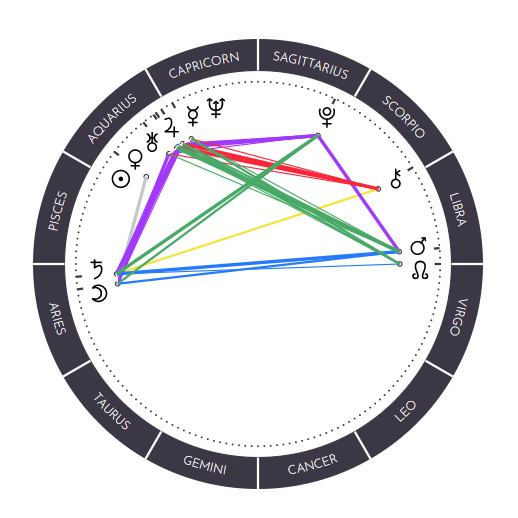
・・・・☆・・・・☆ ・・・・
Rosé of BLΛƆKPIИK
Position: Main Vocalist, lead dancer
Born on: February 11, 1997
Birthplace: Auckland, New Zealand
・・・・☆・・・・☆ ・・・・

Sun in Aquarius (22°), Mercury in Aquarius (2 °), Venus in Aquarius (9 °)
I decided to group all three planets together to flow easily from one placement to the next. In a nutshell, she acts, talks, and loves like an Aquarius! Rosé’s chart forms a beautiful cradle shape with Aquarius, Aries, and Libra dominating her inner planets. The mix of fire and air elements create a great conversationalist who always stands up for what they believe is right.
Starting with her sun in Aquarius, Rosé is someone who naturally stands out from the crowd. I have no doubt she was a popular girl in her high school years. Aquarius natives exude mystery. At first glance, they seem like they aren’t truly there. Their physical body may be present but in their mind, they are in a separate plane of existence entirely. And that’s exactly what makes people fall for them. For Rosé, it’s easy for me to tell what made her my Blackpink bias. She fits my preppy happy go lucky girl who at first seems shy, but once they’re comfortable their high energy is off the charts.
It used to be that she was labeled as Blackpink’s quietest member according to her profile. But as seen from their reality show, she could rival Lisa’s boisterous Arian energy! Aquarian natives are exactly like this. They are sociable but at the same time, detached from the world around them. This air element would make Rosé opinionated as well. She would most likely enjoy activities such as debating, which require intrapersonal skills as well as critical thinking and logic. These people value knowledge. They view others as sources of this as they like the idea of different perspectives. This means they most likely have big friend groups from all walks of life. Rosé is, of course, no exception to this. With her Aquarius sun being in the second decan, this would give rulership to Mercury which indicates natural-born social skills. Her friends from idol groups all around serve as proof. There are also times where her Arian moon gives her bursts of spontaneity to just casually strike a conversation with someone she deems interesting. You will find that Rosé is an easy person to converse with as she is the right amount of comical and earnest especially in topics she takes interest in. She adores unconventional themes that affect how others see her as a person. As a singer, her individualistic nature is expressed in her unique vocal timbre. She’s been praised many times in the industry for this such as when critic Almira Blancada remarked that “You would know it’s Rosé singing in a heartbeat.” For many, this is her most appealing feature. You will feel drawn to her voice which could be compared to that of a siren’s.

“More of you, less of me” - Rosé’s favorite phrase.
So much Aquarius influence in her chart will conjure unorthodox ideas in her head. Rosé’s definitely one to think outside of the box and look at things from a different perspective. As mentioned earlier, her natural-born social skills are an advantage to help her gain knowledge through the people she interacts with. Like a sponge, she soaks up ideas, thoughts, and beliefs of the people around her. But a downside to this is that she may find difficulty in defining her own beliefs and morals, so it is constantly changing. To make up for this, she practices a strict religion. It is a known fact that Rosé is a Christian who regularly attends mass. In her youth, she has also sung choir for school so there is a possibility that she was raised in this religion. This gives me the feeling that she’s been taught all her life to tone down her Aquarian nature to be different and instead conform to traditional practices. Not to worry, there are still other ways in which this Aquarius influence can manifest. She is musically inclined so she expresses herself through her craft with ease. She would most likely take interest in the field of humanities and social sciences. And with her Aquarius in Mercury, she will openly discuss those topics with other people. She is an idealist to a fault and likes to voice her concerns with the world in its current state. Since Mercury is home to the air element, she will have no trouble vocalizing her inner thoughts. But there is still a drawback to this. Even though ideas come to her easily, they will come in bulk. The difficulty will present itself in trying to vocalize all of them clearly and concisely. There will be times when her expression rubs people the wrong way. Despite her intentions being pure, the delivery might be way off which is a factor essential to communication. As a result, she will appear scatter-brained or insensitive. Aquarians need mental stimuli like they need air lol. There is a primal instinct to question the status quo for her and ask thought-provoking questions. Since this planet deals with communication, some topics she brings up may not be taken lightly as she would. Of course, Rosé has probably resolved this by conversing only with people who share the same thought pattern and ideas as her. A developed Aquarius in Mercury heightens the impact of her words which she can weaponize if deemed necessary.
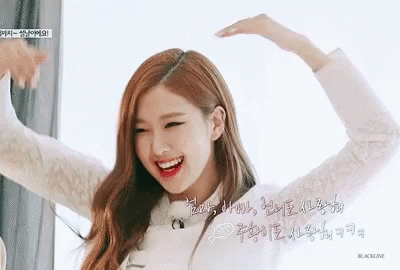
An Aquarius in Venus falling in love is a wonder to everyone else so to speak. They are scared of the idea of love and commitment yet when they’re in love, they’re completely lovesick. Venus in Aquarius is vague when communicating their love calls. You think they like you but only after you've decided to "return the feelings" they'll say they only see you as a friend. Or in its antithesis, they might really like you but you’ll only find out long after they’ve moved on when they mention it randomly in a conversation. You can still pick up the subtle nuances of an Aquarian in love. They adore individuality and point it out in conversations with someone that has caught their eye. They will like talking to this person in general and look forward to forming a strong mental connection with them. They’re flirty with everyone but this person will have the honor to see the vulnerable parts Aquarius hides behind the extroverted exterior if they play their cards right. Those who naturally stand out appeal to a Venus in Aquarius the most. Rosé’s ideal type being someone nice, genuine and with a nice voice specifically confirms this.
Being in a relationship with Rosé will be a love comprising of late nights talking about the universe and purpose in life. Aquarius is a fixed sign, they are stubborn and astute in just about everything. When it comes to love, she will become blinded by a devotion without question and it seems that’s why they find the concept of love so scary. She won't be possessive and understands her partner will need time for themself. She will speak to them in a way only the two of them will understand. A secret love language if you will. This lucky person will be present in the planning of her future and with her moon in Aries, she’ll take on the challenge of making it her present.
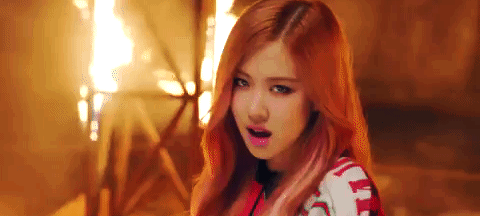
Moon in Aries (10 °)
Rosé’s Arian moon gives her a sense of impulsivity. Fire moons feel with their whole body. They have profound emotions that have to be addressed immediately and can’t be kept bottled inside. Because of this, Rosé is a sensitive person who can cry easily at the first cause of frustration. She likes the idea of communicating her concerns and insecurities to people but finds it hard to when actually put on the spot. Deep down there is a lingering feeling of not being good enough and so she tries to excel in everything. A con for this placement is that it’s a self-serving one. While in a healthy amount, this might seem like a positive seeing as Rosé would be more in tune with her emotional self. It will become negative when she allows herself to react before thinking rationally. This will lead to her exploding in an argument say things she doesn’t mean in the heat of the moment. This can still apply to a casual conversation as well when she unwittingly says something that provokes the other person. This placement projects out of her when the need arises and overwhelms her Aquarius sun in outbursts of intense emotions. Aries is the first of the zodiac signs which gives a childlike naivety to Rosé's subconscious. This makes her adore instant gratification. If she wants something she has to get it, no matter what stands in her way. No matter who stands in her way. Aries moons can be competitive as well. To her, if all of it were for nothing, then what’s the point? This is what she keeps in mind when faced with a challenge that tempts her, which is what sets her apart from the impetuousness of a Sagittarius. On the other hand, this is what enables her to just be herself. Aries dislike being told what to do. They lead, not follow. In Rosé’s case, her Aquarius sun tells her to stand out and her Aries moon tells her to embrace it even if she gets called weird. This fiery element in her core also empowers her to take big risks—like auditioning for a big company like YG entertainment at the age of 15. Although she initially thought her father’s prompt for her to do it was just a joke seeing the difficulties in becoming a K-pop idol, she still went ahead and did it anyway. And if that doesn’t explain the sheer drive of an Aries, I don’t know what will. She dislikes the idea of limitation but whether or not she likes it, some things just won’t go her way. I noticed she also needs physical stimuli, which manifests in habits such as biting her fingers when no one is looking which she admits to doing.
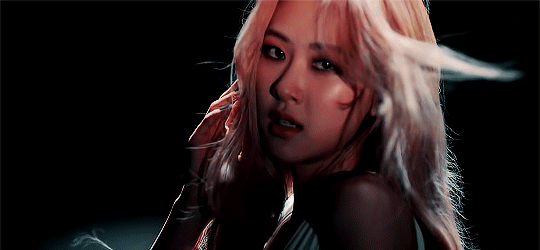
Mars in Libra (5 °)
Libra is in detriment in Mars. This basically means that this sign isn’t comfortable in this planet and doing things related to what it governs, which for Mars is passion, assertion, and separation. Libra’s planet of rulership is Venus, which is the exact opposite of this planet. Because Mars is a malefic planet, it urges the natives to do actions according to what this planet represents. In Rosé’s case, she just goes about it the Libra way. The typical Libra characteristics are that they are the peacemakers and hopeless romantics. They go about life in a way that their aspirations are larger than life but then they don’t put in the effort to attain them and just expect it to fall on their lap (not unlike a Pisces.) This gives me the impression that with this placement, Rosé has a side of her which makes her lack motivation to set and accomplish practical goals. As I previously mentioned earlier, what started as just a simple joke auditioning for one of the biggest entertainment companies led her to her path of stardom. If she didn’t have her impulsive Aries moon to empower her to believe in her talents on that particular day, then maybe she wouldn’t even be a part of Blackpink today! In everyday life, Libras avoid confrontation by all accounts. Unfortunately, Mars is also a planet of war and conflict as in Greek Myths, its counterpart is the war god Ares. As you can tell, this makes Rosé secretly like stirring the pot and she does it without thinking. This manifests in taking the opposing side in discussions and bringing up controversial topics. Although Libras are already known to love drama without outright expressing it, this placement basically confirms it. Without a strong Venus to create an equilibrium between these two planets, this may strongly affect her temperament in a way that her Aries moon will.
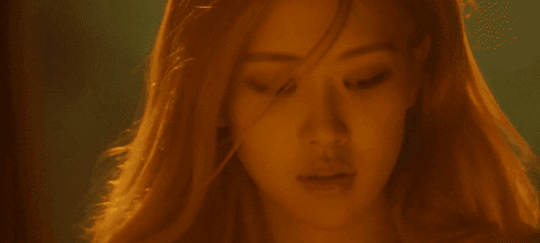
All in all, Rosé’s chart tells me that the stars have aligned at just the right moment at the time of this wonderful girl’s birth. She embodies the true Aquarian through and through for all the good they are known for. She has the fiery core of an Aries that manages to leap out of her in just the right moments. She is someone who wants and deserves a lot of love so please give it to her! She just wants to make the world a better place :( Rosé has always had a penchant for singing and her unique voice just gives her all the more right to do it. She is one to strike inspiration in others for this and she knows it and I hope she embraces her talents fully and unwaveringly. This is why she is Blackpink’s main vocalist without a doubt. Beyond that, she is a girl with a powerful mind and a voice that speaks for it accordingly.
∧_∧ (。・ω・。)つ━☆・*。 ⊂ ノ ・゜+. しーJ °。+ *´¨) .· ´¸.·*´¨) ¸.·*¨) (¸.·´ (¸.·’* ⛧
#astrology#zodiac signs#rosé#park chaeyoung#blackpink#kpop astrology#blackpink birth chart#rosé birth chart#kpop#aquarius#박채영#blackpink astrology
5 notes
·
View notes
Text
RWBY Recaps: Vol. 5 Known By Its Song
This is a re-posting from Nov. 18th, 2017 in an effort to get all my recaps fully on tumblr. Thanks!
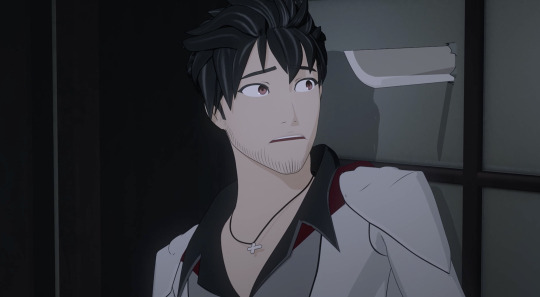
Five years on air and RWBY still has the ability to make me stupidly emotional. This episode was no exception.
Our title, "Known By Its Song" comes from the old saying that "A bird is known by its song, a man by his words," presumably referring to times when a man's "word" was equated with his honor. We begin the episode with Qrow--someone who is notably both man and corvus, a dichotomy that the episode will later comment on--who is out keeping his own word to Ozpin, searching for other huntsmen and huntresses to help them in their battle against Salem.
...and he's a complete drama queen about it.
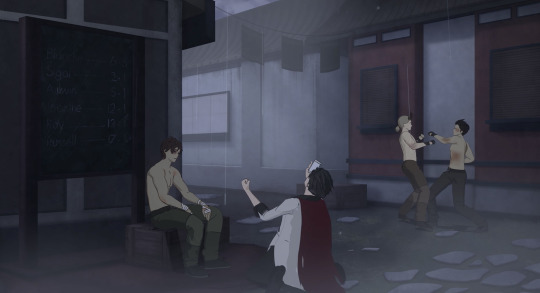
Yes, in retrospect this is a Very Serious Situation, but getting a montage of Qrow literally bending over backwards in frustration before finally collapsing to his knees? Pretty hilarious. The first bar he visits, looking for someone named Shiro, doesn't go well at all, but for two minutes at least we can chock everything up to Qrow's semblance: the bartender doesn't know where Shiro is, he's not allowed back until he pays what he owes, and that debt is apparently high enough to warrant Qrow getting a knife thrown at him through the wall. Yeesh.
As his mission continues though, it becomes clear that there's far more at play than a bit of bad luck. Qrow is conducting his search in the poverty stricken areas of Haven, which is both a wonderful bit of world building and a perfect bit of characterization. After all, Qrow had a life of raids and disreputable behavior before he hooked up with the Ozilluminati. Any friends that he goes "way back" with are bound to be, if not criminals, then other huntsmen and huntresses with equally dubious pasts. The area where Qrow expects to find his friends is drab and gray, a sharp contrast to the beautiful seating area he'll rest in later, complete with holographic technology and a water garden with lily pads. The houses are boarded up and falling apart. The people wear filthy clothes, spend their time betting on street fights, and have some rather horrific injuries--hello, one-eyed weapons seller. What really completes the picture is a sign outside the bar proclaiming that there are NO FAUNUS allowed. Here in the U.S. racism has long been used as a means of pacifying those at or below the poverty line. Struggling to survive? Facing a government that cares little about whether you eat or your kids go to school? Well at the very least you're still white! It's a horrific truth about this country, but a truth nonetheless, and for once I'm glad that Rooster Teeth is forcing their race analogy back into the narrative. As flimsy as it still is, it does make sense that the most poverty-ridden parts of Haven would also be one of the most overtly discriminatory. This is just a more blunt version of what we saw back in Atlas during Jacques' little charity ball. He makes speeches about faunus who complain about dangerous working conditions. Bartenders in Haven slap up signs on their wall. It's the same thing with a different face.
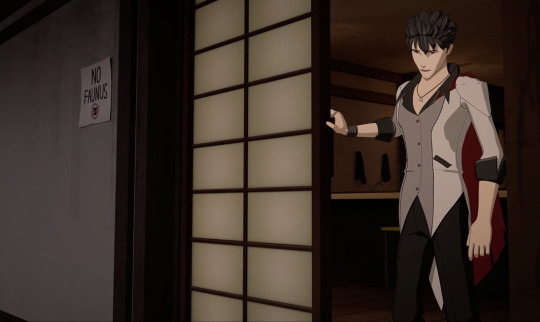
Not that Qrow has time to worry about that right now. He runs through name after name learning that each person is missing--or worse. His search comes to an end when, frustrated, he reams out a guy right before a little girl toddles up, asking if this strange man knows where her Mommy is. I find it rather poignant that it's in this moment, one of his worst, that Qrow actually resists his flask. Perhaps he wants to keep feeling whatever emotions rose up from that little encounter. I think he hates himself just enough to go that route.
I also find it reassuring that for all his talk about how he can't get close to others because of his semblance, Qrow does know a lot of people. He's popular in his own way, making allies, acquaintances, and friends on both sides of the fence, so to speak. It's a punch to the gut when we see him back among Haven's upper class, staring at a mission board like the one we saw in Beacon. Every name up there--all these people he's come to care about--are missing, gone on search and destroy missions and never returned. Just as the viewer is beginning to realize why Shiro hasn't payed his debt, that it probably has nothing to do with a sleazy nature, Qrow is back at the bar. He pays off the money Shiro owes and tells the bartender firmly that "His name is clear" now.
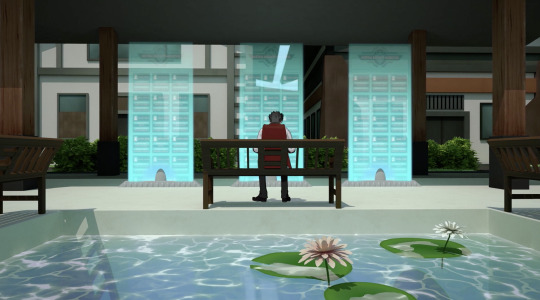
I'd be more moved by this scene if I wasn't distracted by how the hell lien works in this world. Seriously. It seems straightforward enough at first glance. Different colors represent different amounts, right? But then here's Qrow throwing down a single card that pays off the16,000 debt. That seems like a random number. Who makes a 'bill' worth that exact amount? Unless Qrow payed him more than the minimum, or that was acting more like a credit card.
I don't know. This is the fantasy show that has yet to introduce languages other than English. You can't look too closely at RWBY's world building.
On to things I can actually conceptualize: Yang and Weiss are finally having their talk with Raven. Who was surprised by the setting that includes a decorative tea set and low table? Not me. I've seen a bunch of comics these last two weeks depicting that conversation exactly as it occurred, at least aesthetically. How did we know? Something something Yang's Asian influence. Again, don't look too closely. The point is that Raven is starting a very ironic conversation regarding "truth."
I actively dislike this woman.
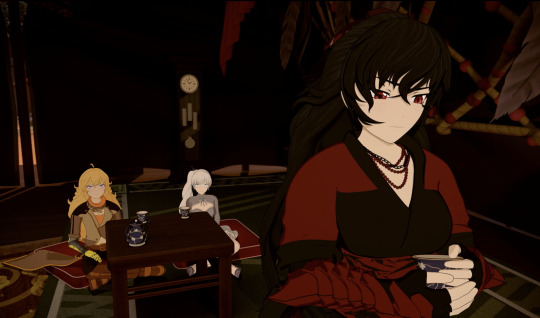
Her attempts to manipulate Yang two episodes back were pretty blatant, but kudos for better subtly here: by insisting that Yang needs to question everything--including Raven--Raven actually positions herself as both wise (the one to gift Yang with this advice) and trustworthy; as the only one to admit her own, potential duplicity, she paradoxically comes across as the most honest. Too bad Yang's too smart to fall for her mind games. Or too straight forward. Weiss is the one talking herself in circles about whether magic might actually exist or not. Yang has a laser focus that nothing can penetrate: find Ruby.
I said last time that Raven was going to either drop some crazy plot twist about Ozpin, or just catch the girls up on what we already know. Looks like Rooster Teeth went with option two. Raven (taking her sweet time and being real vague about it) sums up what we've learned this season, if not earlier: Salem is a person that exists and is a Big Threat, she wants to kill off all of humanity (which presumably includes the faunus?), magic is a thing, and Raven just happens to know someone who can "come back from the dead." Wow. Wonder who that could be!
She does actually drop a few tidbits of interesting information. She reveals that she and Qrow entered Beacon to learn how to kill huntsmen and obviously only one of the twins was dissuaded from that goal. Her comment that the entrance exams were "child's play" is particularly fascinating because I'd always assumed there had to be something beyond just sending in transcripts and not screwing up initiation. Which begs the question, how did Jaune get past an exam of that caliber? Did Ruby just skip it with Ozpin's permission? Presumably.
In the end though, no matter how much Raven might want Yang to believe her "truth," her overwhelming bias shines through. The fact that she claims to have info on Ozpin and makes the beginning of the conversation all about Qrow hints at those feelings of betrayal. She ends the conversation on Tai--an insult that finally has Yang losing her patience. And throughout the middle Raven emphasizes that Salem is an entity that can't be stopped. Her beef with Ozpin (according to this conversation at least) isn't that he's inherently evil, but that he's convincing people to fight with him in an impossible war.
The problem here is that Raven is the only one who sees this war as "impossible." I've touched on this before, but Volume 5 is pulling strongly from that mission in Mountain Glenn, back when Oobleck got Team RWBY to think about why they wanted to be huntresses in the first place. Yes, on the surface that episode seems to confirm Raven's belief that most enter the life for money, fame, or power: Blake wants tools to fight for equality, Weiss wants to break away from her father, Yang wants an exciting life--they all have ulterior motives. But Raven didn't watch the full episode, all the way to when the girls acknowledge this around the campfire and make conscious (if silent) decisions not to be overly influenced by these motivations. They're fighting first and foremost because it's the right thing to do. Raven sees them as the "poster children" of Beacon academy, naive kids who are too blinded by their ideals to realize how cruel the world is, easily manipulated and then sacrificed by Ozpin. But she's the one who's blind here. The girls know more than they let on, they've acknowledge their failings and the world's... and they've decided to fight anyway.
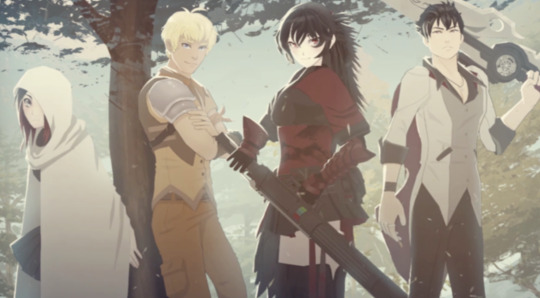
For Team RWBY/JNPR fighting Salem isn't impossible. It's just incredibly hard. Ruby, their leader, is the embodiment of this belief, reminding Oscar last episode that they have to keep moving forward. And it’s a sign of growth: Team RWBY is what Ozpin once hoped Team STRQ could be. Raven hates Ozpin because she sees a man sacrificing pawns to an unbeatable foe. Ozpin's allies love him because they see a man doing everything he can to defeat an incredibly powerful foe. But not an invincible one.
Of course, we don't have all the information yet. Raven says that she hates Ozpin for one more reason, for "what he did to my brother and me." The pacing of this scene is important, because Raven's second in command tells Yang and Weiss to go "see for themselves" what this horrible sin is and it's then that we get Raven soaring through the air in her bird form. It's been a big question for a while now: how can Qrow and Raven transform if they have other semblances? The reigning theory was that it had something to do with their tribe connection, but now it seems that this was, somehow, Oz's doing.
Oz is the Wizard theory, anyone?
Why Raven views being able to turn into a kickass bird as a bad thing, I don't know. Some aversion to magic perhaps? Is there a downside here? I’m rather confused as to how this is something bad... And I'd actually always assumed that Ruby and Yang knew about their uncle's ability, but we learn otherwise here. Why keep it from the girls then? Is it just because it's personal, like a semblance? Or does Qrow also view his transformations as something tainted... unnatural even? I hope this aversion is addressed. Perhaps it will tie back to this volume's focus on semblances. In that, if Team RWBY is truly Team STRQ 2.0, then Ozpin might well gift the girls with new abilities too, just as he did for Qrow and Raven. He's already admitted that there are heights to reach beyond merely unlocking and practicing your semblance--heights that he can perhaps unlock.
Which raises another interesting possibility: Could Summer do something extra? ... can Tai?
(And then here's prodigy Ruby with semblance, silver eyes, and potential magic powers on the way. Don't overload the small child lol. There needs to be some struggle.)
In the end, if Raven had hoped that her little talk would get Yang on her side she was very mistaken. She opens the portal and Yang drives them through without hesitation, right when Qrow is agonizing over what's happened to all his contacts. His panicked "Raven?" transforming into a simple, happy "...oh" was a blessing in two words.
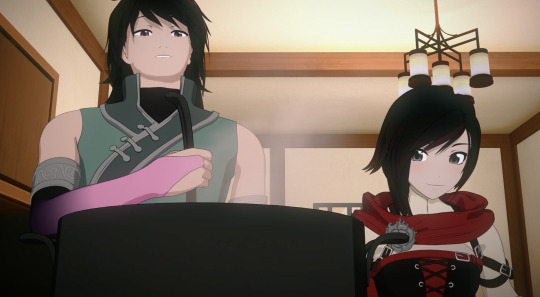
Then. Then we're given the scene that watered my crops, cleared my skin, and has done all my other writing for me. Ren, Nora, and Ruby happily cooking up a huge dinner together, expecting a whole slew of fighters to show up with Qrow and intending to feed every one of them. Ruby burning the food despite Ren's warnings. Hearing Qrow calling her and knowing what was about to happen. It’s all great.
I really love that Ruby was so nervous when she caught sight of Yang. Despite her letter last volume where she admits that running off to Haven was reckless, we haven't seen much about her thoughts on that decision. It all comes tumbling out here though. That a part of her regrets it, how sorry she is that she didn't wait for Yang, she should have tried to do more...everything. Not that Yang blames Ruby for any of that. She takes one look at her crying sister and runs to hug her, saying only, "I love you."
And Weiss... oh Weiss. How dare you question your place here. She looks discouraged for only a moment before Ruby (always perceptive) calls her over.
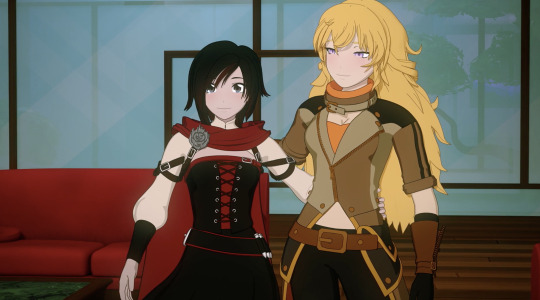
The episode ends with this.
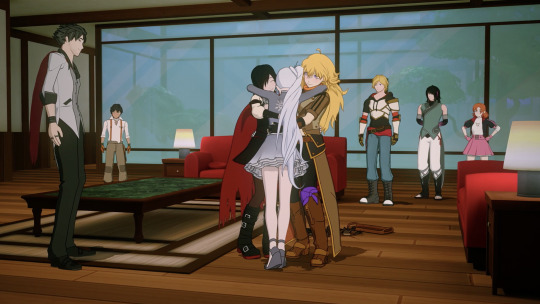
And we're officially halfway through the volume. We've got Team RWY back together, much sooner than I expected, honestly.
Now it's time to find Blake!
Other Details of Note
Of course Weiss can tell the difference between a crow and a raven. I mean yes, that was necessary for the plot, but still.
Weiss' "I know that you're really obnoxious" in response to Raven's attempts at hospitality. Pfff drag her.
Weiss' eye roll when Raven said she wouldn't be as "nice" next time they meet. Please.
Weiss' overt concern for Yang and saying straight out that it's okay if she's not okay and my god she was on fire this episode for someone mostly sticking to the background.
Yang telling Raven not to talk about "my family" that way. Raven is no longer a part of that picture and I want to cheer at how Yang is handling all this so far.
I also appreciate the contrast, visually, between Qrow's transformation and Raven's. Their 'reveals' are done in opposite directions and for opposite purposes: Qrow transforms while flying left to right across the screen and attempting to save his family; Raven transforms right to left while trying to keep Yang from hers. Nicely done there.
I forgot to mention this last time but... can we lay off the Nora + food jokes? It was funny before we learned she starved for most of her childhood. So yeah, comments about how she's going to eat everything in sight aren't so much a joke as a sign of trauma. Let the poor girl eat what she likes.
Yang cradles Weiss in "Lighting the Fire" the exact same way she cradles Ruby here. Yang is confirmed big sister to the entire RWBY/JNPR group.
Oscar's confused look that melts into understanding, courtesy of Ozpin. It's a subtle moment, but just another indication of how they're synching up. Lovely detail there.
25 notes
·
View notes
Note
You are literally the prettiest thing! You've inspired me to love myself and it's just really cool. Keep slaying the game💘
thanks, buddy! that’s a really nice thing to say. i talk a big game about how i don’t come here for any kind of validation from the public or whatever, but it’s not like i’m immune to positive responses. i’m not sure what the standards are but i think i’m technically “pushing 40” now, so i dunno, i guess it’s nice to feel vital in some ways. NOW i’m about to say something that sounds really negative, but i swear it’ll have a good outcome so sit tight!
personally i get really obsessed with this fantasy that we should be able to separate our evaluation of people, including ourselves, from the accidents of physical appearance. i get really worried when i hear people saying things to the effect that someone is “beautiful in their own way”. it always seems to mean “not beautiful by accepted standards (probably not even the standards of the speaker)” which in turn suggests that not being beautiful is such an unspeakable fate that we come up with all sorts of euphemisms to obscure the truth–and then THAT in turn suggests to the subject that their state of being is so disturbing to people that they’ll do anything not to tell the truth about it. bummers all around. i’m just amazed by how completely controlled we are by reproductive drives, like so much so that we assign all kinds of meaning and power to beauty, even though most forms of it just boil down to signals of a person’s generic breeding potential. i have this hot friend with a really gorgeous rack, who once told me that her feelings about it were just like…a moose displaying its antlers to snare a mate, something really primitive and based on the survival of the species and not cool or cute or interesting at all. (incidentally, she spent a lot of her teenage years wearing a binder, in spite of being absolutely cis-het)
ACTUALLY my obsession is a lot bigger that all that. like, we all know about how “sex sells”, but people don’t always note the inverse–that sex doesn��t just sell better, but that it can be actively difficult to sell something WITHOUT sex. i consume a lot of horror and sci-fi and fantasy media (in that order), and i’m constantly struck by the fact that even when people try to imagine like the most ultimately powerful being or whatever, they can’t seem to separate the idea of power from sex appeal, everything always has to be all horny-looking all the time even if eroticism is not even part of the story. this is actually a big part of the reason i stopped reading superhero comics, first i just got sick of looking at the same bodies and faces all the time, then it became a philosophical quandary: why can’t even the most imaginative artist seem to leave these porn star looks out of non-pornographic works? it’s so weird, it’s like, most of our ideas about physical beauty are ultimately informed by sex, and then we have all these crazy emotional & spiritual & mythological ideas about the power of sex only because our hormonal bodies are constantly urging us to procreate at all costs. if you could somehow take the reptile brain influence out of the equation, sex would probably seem pretty ridiculous. but, i guess that’s just never gonna happen.
(PS this is why i love people with freaky fetishes so much, they’ve taken the sex OUT of procreation and put it somewhere where it ONLY has emotional and spiritual and mythological trappings. get on down, pervs!)
uh but obviously i’m aware that the ability to separate self-esteem especially, from appraisal of attractiveness, is never gonna happen, so all that said, here’s some things that might be useful to think about while you’re trying to love yourself:
- any picture you see of me is one of like 100 versions that i snapped, desperately searching for a good angle. i don’t have a good sense of how much i look like my pictures in “real life”, but it could be pretty different. my point is that i think this is probably almost universally true of most nice-looking selfies you see all over the internet, the people who look good to you, or that you aspire to look like, probably work a lot harder on it than you might ever guess.
- the demented undercurrent of this is that i think my main reason for taking pictures of myself is a subconscious feeling that i don’t really have any idea what i look like, somehow, so i’m constantly trying to figure it out…which makes it absurd that i’m cherrypicking the best images. i bet a lot of people are similarly motivated, though. sometimes i kinda dare myself to post bad pictures anyway. a little while ago somebody recommended that i check out stoic philosophy, and it turns out the stoics recommend that kind of thing too, to get yourself detached from perfectionist anxieties and prepare yourself for the real world more.
- at almost-37 i’m naturally a lot heavier than i was in my teens and 20s, but the weird thing is, i feel exactly the same as i did then. i have exactly the same feelings about how my clothes fit me, and the exact same “damn, i really wanna lose some weight” feelings regarding the exact same parts of my body as then. i don’t really have an explanation for that, but i think it reveals something about how we feel about ourselves–how artificial it can be, how departed from reality, how rooted in the story we tell ourselves, about ourselves. (although i think this also indicates that i’ve been wearing my clothes in the exact same ill-fitting way my whole life, at all sizes! i guess i must be very precise)
- i think that most people, even *hot people*, have a vision of some sort of inner self that they think better represents what kind of person they are. like i have kind of a short thick rockabillyish hourglass figure and wavy/curly hair, which has cultural connotations of being really feminine, sensual, sassy and slutty. however, living deep in the recesses of my brain is a flat-chested broad with short and straight or NO hair, with veins in her arms and calves, with long legs that make her fast, and a frame that all clothes just kind of drape on. somehow i’ve absorbed from the ether that women with my personality should look like that. unfortunately, even if i were to starve myself or start aerobicizing like crazy, i’d never look remotely like that, my skeleton isn’t even the right shape. obviously there’s some people who like the way i look just fine, one of them is marrying me–but i’d bet that a lot of people who look great to others have some mysterious totemic inner self that they can’t manifest physically, and that’s not even necessarily related to the typical beauty standards. it’s just something to think about when you’re thinking about ideals.
so i’d say like, while you’re working on seeing yourself as beautiful, you can also ask, what does beauty mean to you? what do you think beauty even is, or how many kinds can you name? when you compare yourself to others, do you think you’re missing out on something other people are enjoying, and if you notice yourself feeling that way, do you think it’s really true?
17 notes
·
View notes
Text
MAYBE THE DONKEY IS THE HERO?
People who care about literature and western culture are supposed to care about Don Quixote. Scholars regard it as not only one of the first novels ever written, but also one of the greatest novels ever written: pretty impressive for a first go!
In western traditions, Spain glows in bright, creative sunlight. Music, painting, sculpture, architecture, mathematics, literature: Spain offers riches. Somehow, some way, Cervantes’s errant knight on his noble donkey has come to be part of that pantheon. But while I’m sure The Don was well intended, as a character he doesn’t make me lean in to the tale. I can’t deny, however, that Señor Quixote holds unique pride of place in the literary canon. Everyone should, therefore, at least know the basics, regardless of how you feel about the book. If you’re hiding in the back of the class, still unsure, I promise not to point you you. Here’s the wispy limn:
A middle aged nobleman reads widely and imagines vividly. As a result, he determines himself to be a knight and sets out to right wrongs and fight injustices, with plans of restoring a measure of virtue and morality to an otherwise corrupt world.
It’s a good premise in my humble opinion. Filled with allegorical power and the potential for comic flights to convey vital ideas, our hidalgo hero sets out on his quest. Unfortunately that’s where my own private exasperation sets in. Rather than calling foul on untenable circumstances, he sets his sights on forces that are not, actually….anything important at all. Most famously, he challenges windmills.
I’m no literalist. I understand the metaphor here, and the sublime satire, and even the narrative messages of fighting against impossible odds. But it’s one thing for a group of flower carrying children to oppose a ferocious army on the field of literary battle. It’s quite another to have a deluded man stand up for idealized values and virtue and essentially oppose meaninglessness. That’s a character waiting for a better world rather than trying to move a mountain. That’s a character waiting for Godot.
In leveling his lance at windmills we see that The Don is deluded. That’s okay. There’s a great history of literary fools who present important messages to surrounding characters and, more importantly, us readers. To be foolish is to make erroneous judgements. A lack of intellectual capability is not the province of literary clowns, nor would that lack of smarts even be a fair or legitimate target for literary poking. Fools are about doing dumb things in the face of reality. In Quixote’s case, he’s presented as a man with a need to do important things, virtuous things, constructive things, but he can’t tell what they are. He doesn’t really perceive what’s real in the real world. What’s more, his fantasy world isn’t representative of the real one. His efforts are wasted, and to me that’s not only tragic, it’s disempowering. In a world where there are seemingly endless wrongs to right and endless injustices to correct, one would hope that a children’s army or a humble hobbit with hairy feet would stand up and at least try, even if there were no chance at success at all. Hollow efforts to declare that windmills are dragons spends the character’s precious life not on morality or values, but on deluded self indulgence. (Don’t even get me started on Dulcinea!) With real wrongs to be righted, he’s more interested in being the guy to do it, all the while doing nothing at all. He’s not the ultimate idealist. He’s the cranky guy telling you to stay off the grass.
Filmmaking itself is ultimately a quixotic enterprise. (The utility of that eponymous word in a contemporary sense does not certify the merits of its etymology.) The forces aligned against any filmmaker, especially newly minted ones, are enormous. If one gives it very much thought, in fact, filmmaking is a practically insurmountable task. That said, people do it anyway and sometimes they do it very well. What is an artist, after all, if not idealistic? The creative people of the world— the dreamers of the world—are all ultimately idealistic in some form. Don Quixote, we are taught to believe, should be our standard-bearer. How ironic, then, that the thing this false knight ultimately champions is the least tangible thing of all, namely a need for idealism in the first place. The problem is not that he fails, or approaches his quests with absurd strategies. The problem is that in his idealism he fails to see what’s right in front of his eyes. This speaks to an abdication of responsibility, a license for narcissism rather than idealism. The fact that he fails to see what’s right in front of him and instead favors his own private obsessions emphasizes his fatal flaw.
I realize I’m in a minuscule minority here; everybody who knows anything about literature regards Quixiote as a giant, to say nothing of being a slayer of giants, as he puts it so many times in the novel. I realize this book is the cornerstone of Western literature. Its tropes repeat over and over; its characters refract as seminal archetypes. Endless pages of analysis and critique and review and consideration about this singular work have contributed mightily to philosophy and literary thought and cultural mores. Perhaps the real value of Don Quixote is not in the book, per se, but in the scintillation of cultural and intellectual and ethical considerations that orbit it’s unusual gravity well.
Come to think of it, that might ultimately be an idea which could become the backbone of a genuinely interesting tale, namely one where a cultural collective undertook fascinating, even important intellectual explorations based on a questionable map made from a cartographer who only imagined the places he’d been.
@michaelstarobin or facebook.com/1auglobalmedia
3 notes
·
View notes
Note
How do you see relationships between the Gaang progressing throughout adulthood? Bryke obviously did a bad job portraying them in general, and seeing how the other avatar writers felt the same, I imagined so much more for our favorite characters than what Bryke lazily did. Any thoughts on other characters like June?
First of all, therewould be NO leaving Zuko completely on his own to govern the Fire Nation. Thatis just a stupid move politically, militarily,

Jack: Spiritually, ecumenically, dramatically …
You name it. Thismeans that Iroh stays in the Fire Nation with Zuko, so that rather thanbacksliding by chatting with Ozai, Zuko would gain ground in his mission toredeem himself and the Fire Nation. The first few years would be extremelyvolatile, and there would be a lot of challenges ahead. He would have to searchfor his mother and reconcile, somehow, with Azula. But you know who would havebeen there to help him?

Aang. No, not theAang who decided “A promise is a promise!” and went into the Avatar State twice to attack Zuko. No, this Aang hascomplete control of the Avatar State, as he shouldhave by the end of the show, since that was one of the main goals of hischaracter. Aang would have gone to the Fire Nation first, since he spent theleast amount of time there out in the open and would have major trustrebuilding to do after what happened with Ozai.
During his time inthe Fire Nation, he would have discovered Ty Lee as an untrained airbender.This would give him the impetus to start looking for other airbenders, whomight not even know about their gifts. He would have difficulty with awork-life balance, but he would eventually find a way with the help of:
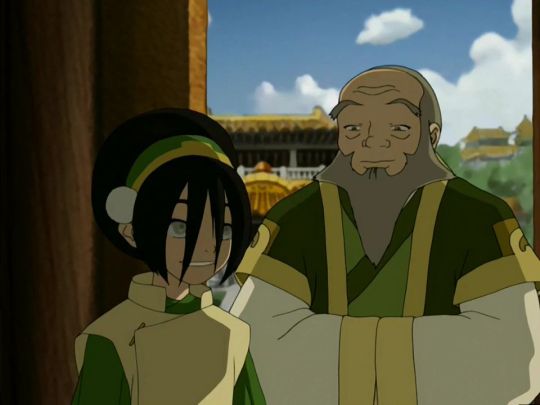
Toph. Toph’smetalbending academy is something I wholeheartedly approve of. I think sheshould eventually become a businesswoman and use her family’s vast wealth tomake Gaoling (and their new ally, Omashu) alternate power centers, so Ba SingSe wouldn’t have such a stranglehold on the rest of the Earth Kingdom, with metalbenders initially acting as private security, and later, a police force in the city. But while I understand that Toph has the attitude of a beat cop, she hates the city,walls, and rules, and there would be a bunch of all three if she became Chiefof Police. (P.S. She would have many more tea times with Uncle, and get that life-changing field trip with Zuko we allwanted to see.)

Toph would alsohave issues to sort through with her parents, and she would probably never seeeye to eye with her family. But one person would help coach her through it:

Katara. At first,Katara would bury herself in her work at the South Pole, helping her father,brother, and Pakku rebuild the Southern Water Tribe. She would be at the heartof social justice issues, especially for Water Tribe women, and would challengemore than one antiquated idea that the Northerners would bring with them. Shewould get many marriage offers once she turned sixteen, and to take a breakfrom it, she would answer Zuko’s request help find his mother. This leads toher realizing how stifled she feels at home, where everyone expects her tocater to them, in addition to helping lead their tribe. She would apply for adiplomatic post to the Fire Nation and eventually create her own cross-bendingschool, adapting her school from Toph’s metalbending academy. At first, shewould worry about not being at home enough to help the women’s rights movementin the Water Tribe, but someone else has the situation under control:
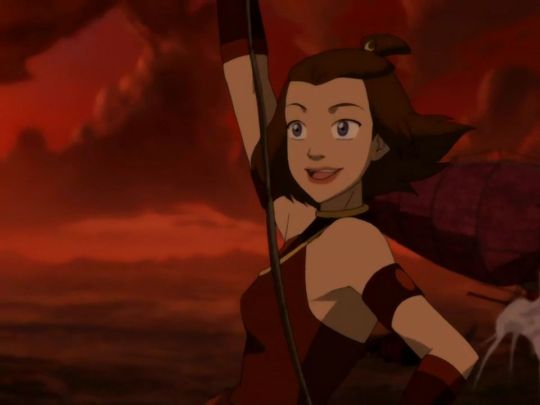
Suki. Suki would bean asset as the head of the Kyoshi Warriors, and also as a partner for Sokka.Her island’s location and the fact that the villagers wear blue all point toWater Tribe influence on Kyoshi anyway, and once the war is over and tradebegins booming again, she would work to make Kyoshi less of a spectator in theworld and more of a participant. She would be an excellent role model forSouthern Water Tribe girls who don’t want to be pigeonholed into the homemakerideal, and could also play a part in Republic City eventually. As the leader ofan island that was neutral during the war, Suki would be an ideal person tohave on the Republic City Council. (P.S. Why it’s a Council of Five when thereare no nonbending representatives in LOK is a mystery to me. This would fixthat oversight.) But who would lead the Kyoshi Warriors if she took up such aposition?
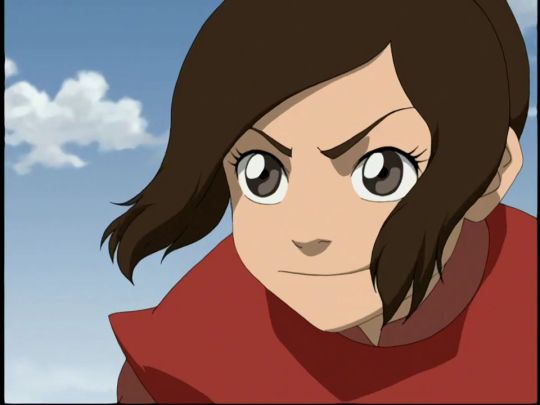
Ty Lee. Ty Lee didn’tget a real explanation for why she joined the Kyoshi Warriors, especiallyconsidering her misgivings about spending the rest of her life as a matchedset. She could turn the tables on the idea, lending individuality to theWarriors and teaching them chi blocking techniques while learning some of theirfighting styles as well. These nonbenders could eventually form the Equalistmovement, but a different one than in LOK—a morally ambiguous movement, insteadof a villainous cadre led by a demagogue.
In the end, though,Ty Lee is a wanderer, and I’m inclined to believe that she is, in fact, anuntrained Air Nomad. Eventually she would discover this, and that not only isshe not part of a matched set; she is possibly one of the rarest human beingsin the world. This would interfere with her “aura” for sure, because she’s notnecessarily cut out for the ascetic Air Nomad lifestyle. So while she would behappy for Aang to train her, she might also butt heads with him about how tobest secure the Air Nomad legacy for the future. Of course, since the AirAcolytes in Korra treated Kya andBumi so abysmally, in my opinion this could only be a good thing. Through itall, she would still keep in touch with:
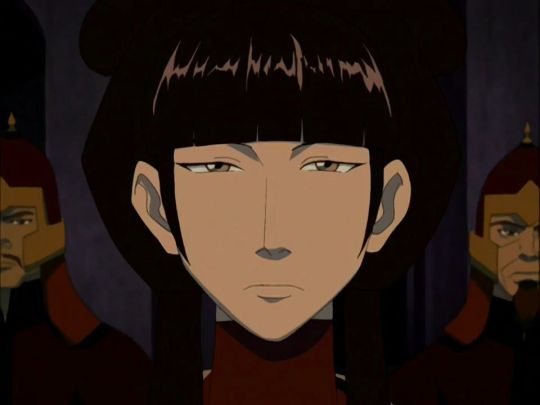
Mai. I have adifferent character path planned for Mai than what other fans might suggest. Maibecoming a bounty hunter is a popular fanon idea, which makes sense, since shedid seem to enjoy tracking down Zuko and Iroh so that Azula could imprisonthem for life, as anyone would enjoy doing to a person they supposedly had acrush on. To me, Mai’s poker face and cool-under-fire attitude screams“White Lotus”, of which there are no female members that we know at the endof A:TLA. The main obstacle to inducting her into the Order would be that theWhite Lotus is based on principles of interconnection and understanding othercultures, which Mai categorically does not have. But this is one of the placesshe could thus grow the most, without having such character development tied toa specific person. The fact that she fooled the Fire Princess means she canplay both sides skillfully, which she’ll need to, considering a rival to theidea of a balanced world is going to be:
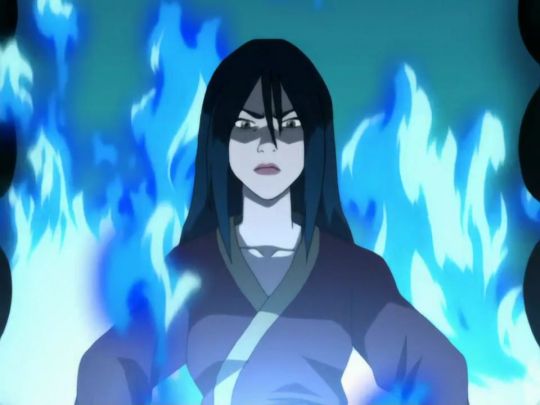
Azula. With Ozaiimprisoned and without his bending, Azula is the most creditable foe thefranchise still has. Patchy though her sanity might be, she is still extremelydangerous (as we saw during the Agni Kai). In an ideal world, she would use heralmost preternatural instincts for personal weakness and manipulation to be aruler, but the very confidence she exudes is based on her rigid mindset and afalse sense of Fire Nation superiority. As natural as leadership might be forher, she burned all her bridges when she banished or imprisoned every followershe had. I like the idea of her relearning the meaning of firebending from thedragons and bringing the Sun Warriors into the modern era, but it would be avery painful character path for her when just being mentally stable is a hugehurdle. I think she would need to stay in the Fire Nation for several years,slowly healing with Zuko’s help, before even attempting it.
There is one otherpath that I would consider for Azula, and that is: the Spirit World. Azula isnot a terribly spiritual person, but a spiritual journey such as Iroh underwentmight actually help her. It could train her mind to separate illusion and self-deceptionfrom reality, and give her a better sense of where she belongs in the world.Not to mention, the Spirit World is dangerous and full of tricksters such asKoh; I think she would enjoy the challenge.
And what about Sokka?
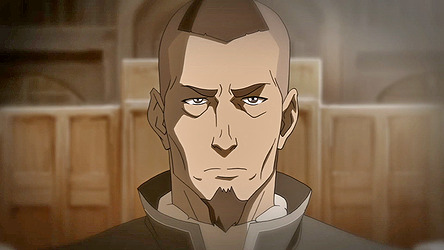
Well, Sokka’s character got shoved to the side in the comics, but honestly, him being on the Republic City council, helping the White Lotus, and likely being chief one day is just fine! Legend of Korra didn’t really do him the disservice that it did the other characters. However, there is one thing that he will never, EVER be, and that is the possible deadbeat dad of Suyin. For my reasons why, please look at this post.
I don’t have ideasfor anyone else, really, but we can’t leave out our most important character:
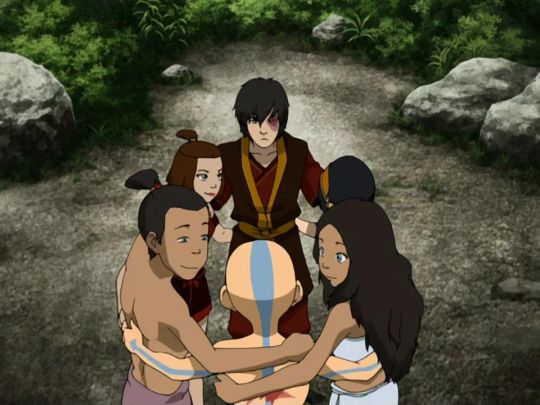
The GAang. In thecomics and LOK, the GAang all seem to have gone their separate ways, especiallywith Zuko being so isolated from everyone except Aang. Katara, too, seemsvery cut off from current events, which is unacceptable. The GAang remainedlifelong friends, regardless of any romantic relationships or lack thereof.Busy and hazardous as their lives might have been, they would always make thetime to write, visit, plan projects, and attend reunions together.
(P.S. I don’t knowthat June needs to develop as a character; she’s one of those tertiarypersonalities that’s just fine with the amount of screentime she has.)
665 notes
·
View notes